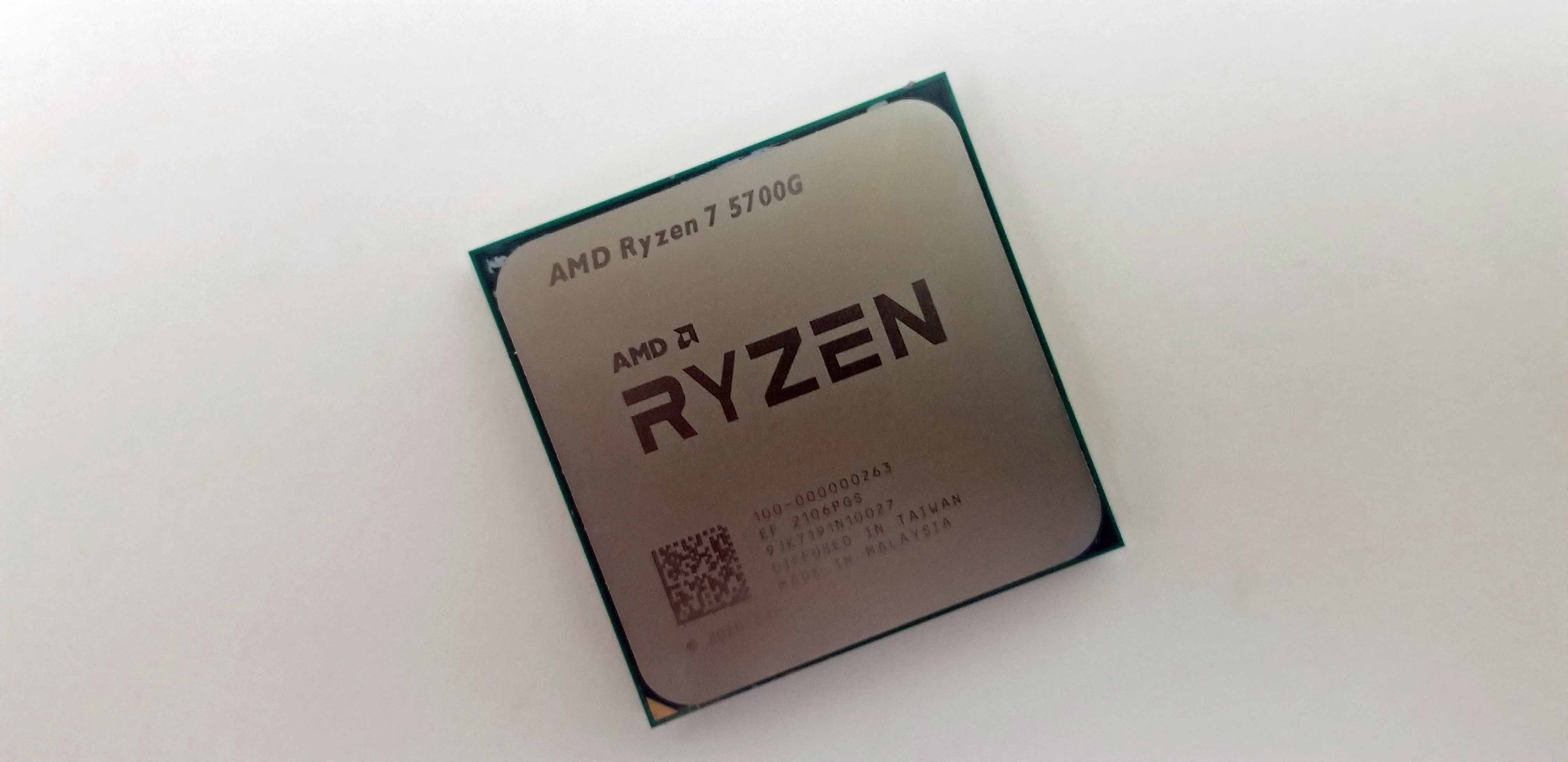Why you can trust Tom's Hardware
AMD Ryzen 7 5700G Application Benchmarks, the TLDR:
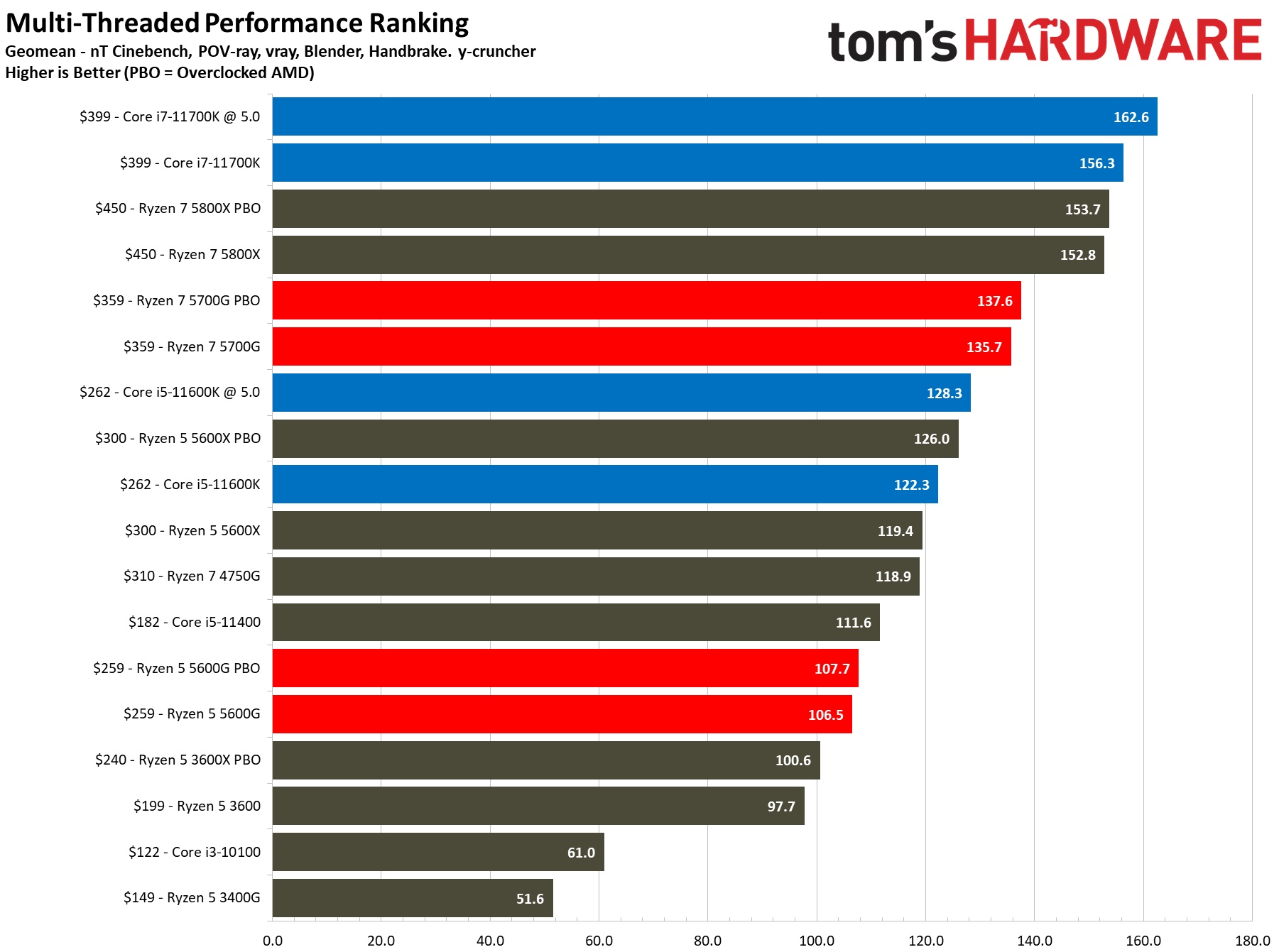
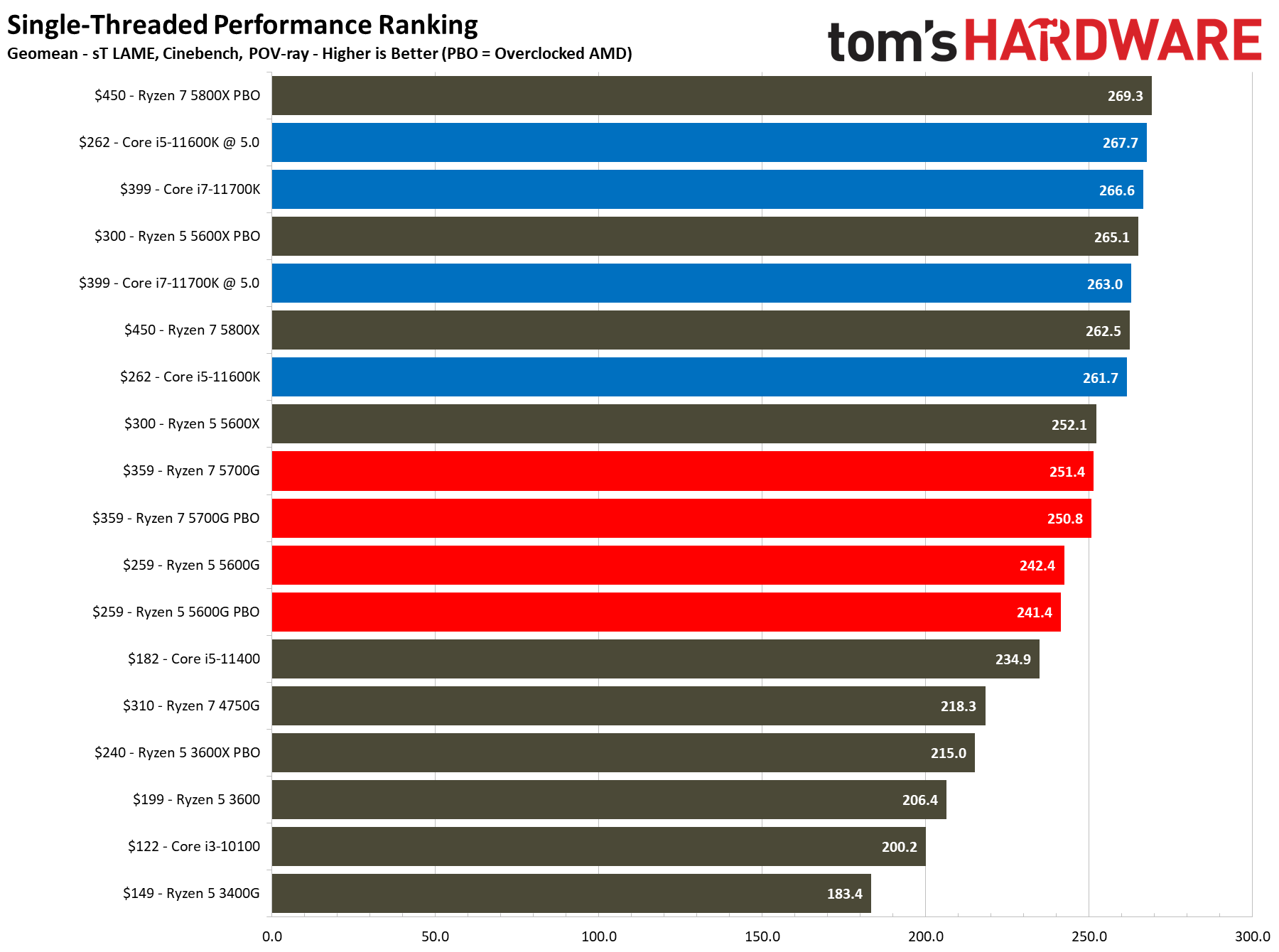
The charts above provide the geometric mean of several of our application tests (listed in the chart title), representing broader trends in lightly- and multi-threaded applications. Be sure to check our application tests below for performance in specific types of applications. To maintain consistency within our test pool, we conducted all of the tests below with a discrete graphics card handling the display output.
The quick takeaway is that the Ryzen 7 5700G marks a huge step forward over the Ryzen 5 3400G, which is expected from moving from four Zen+ cores to eight Zen 3 cores. The deltas in the table below speak for themselves. The 5700G also provides quite the step forward in threaded work over the Zen 2-equipped Ryzen 7 4750G, an OEM-only model.
| Row 0 - Cell 0 | Single-Threaded | Multi-Threaded |
| Core i7-11700K 8C/16T | 100% | 100% |
| Ryzen 7 5800X 8C/16T | 98.5% | 97.8% |
| Ryzen 7 5700G 8C/16T | 94.3% | 86.8% |
| Ryzen 5 5600X 6C/12T | 94.6% | 76.4% |
| Core i5-11600K 6C/12T | 98.2% | 78.3% |
| Ryzen 7 4750G 8C/16T | 81.9% | 76.1% |
| Ryzen 5 3400G 4C/8T | 68.8% | 33.0% |
Here we examine performance compared to the Core i7-11700K as the baseline. The eight-core $359 5700G matches the $300 six-core 5600X in single-threaded work and beats it in multi-threaded work, but still lags the $450 Ryzen 7 5800X in both tests despite having the same core counts and Zen 3 microarchitecture. These performance deltas are expected, though, due to the differences between the multi-die and monolithic designs, including different cache allocations and thermal characteristics.
The $359 Ryzen 7 5700G is slower than both Intel comparables in single-threaded tasks, but it does a nice job of slotting between the $399 Core i7-11700K and $262 Core i5-11600K's performance in threaded work. The 11700K is 15% faster for about 12% more cash, but you'll also have to factor the 5700G's bundled heatsink into the equation.
Rendering Benchmarks on AMD Ryzen 7 5700G
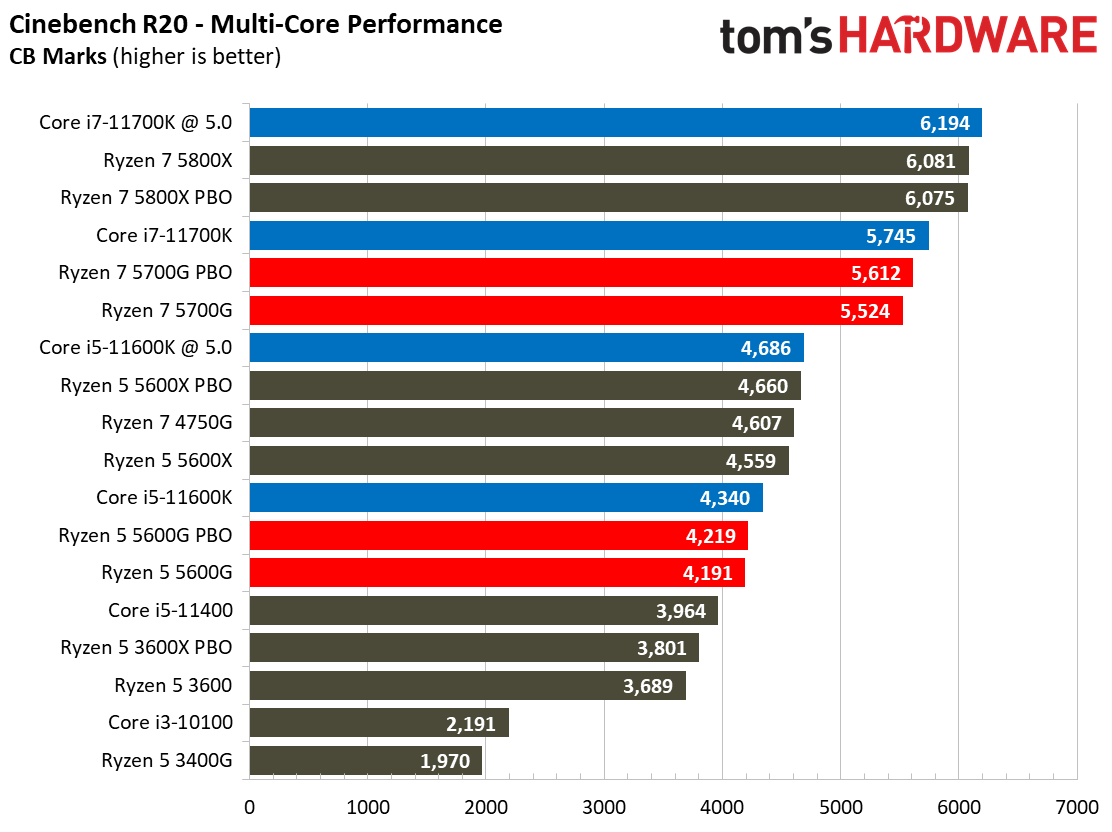
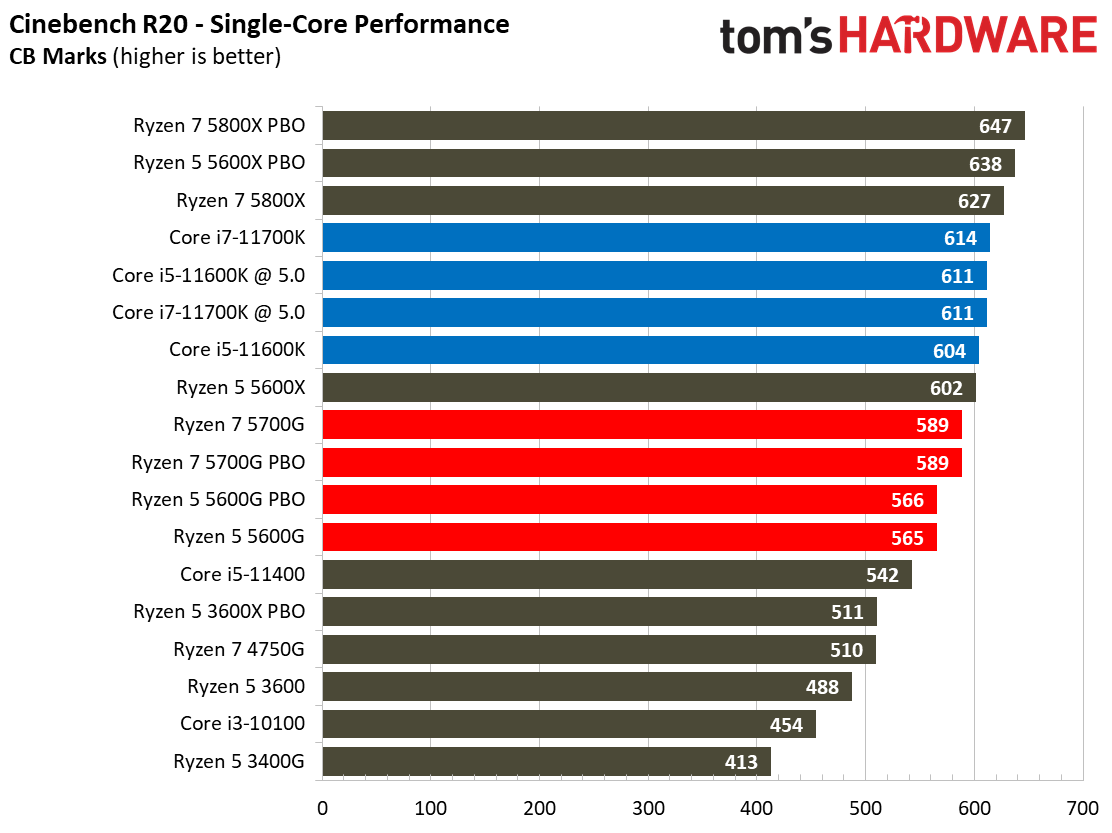
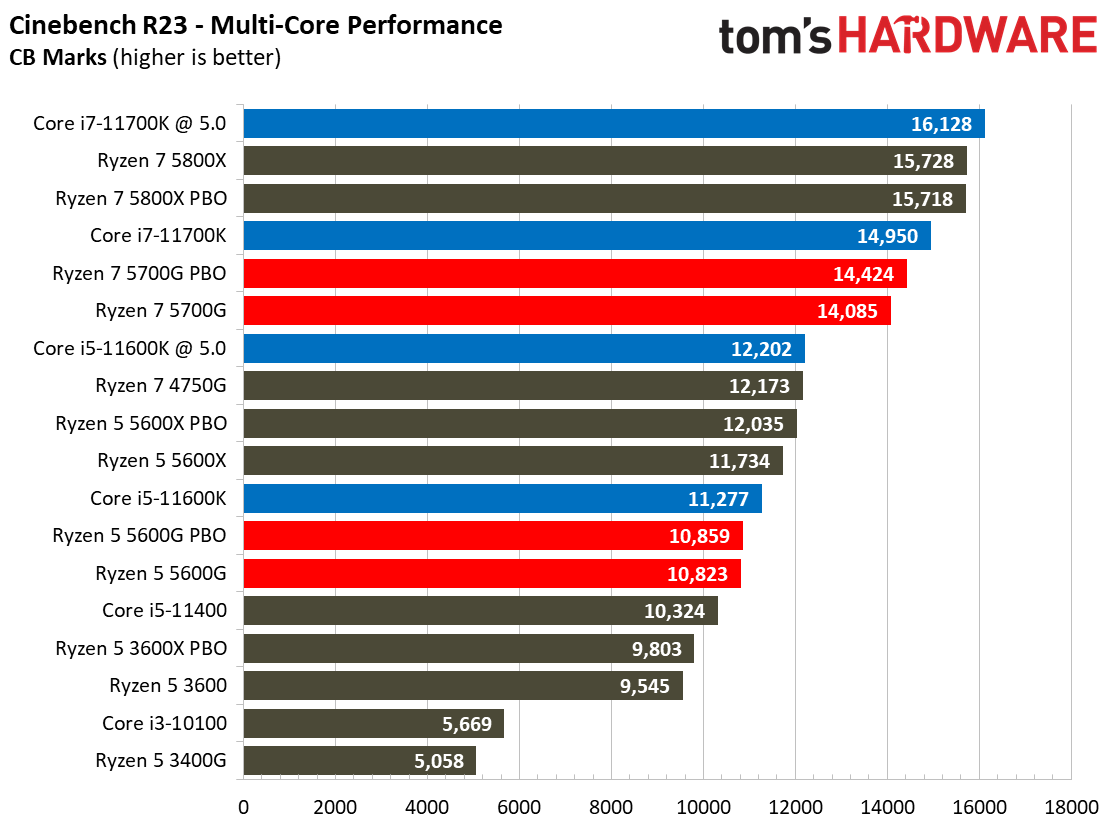
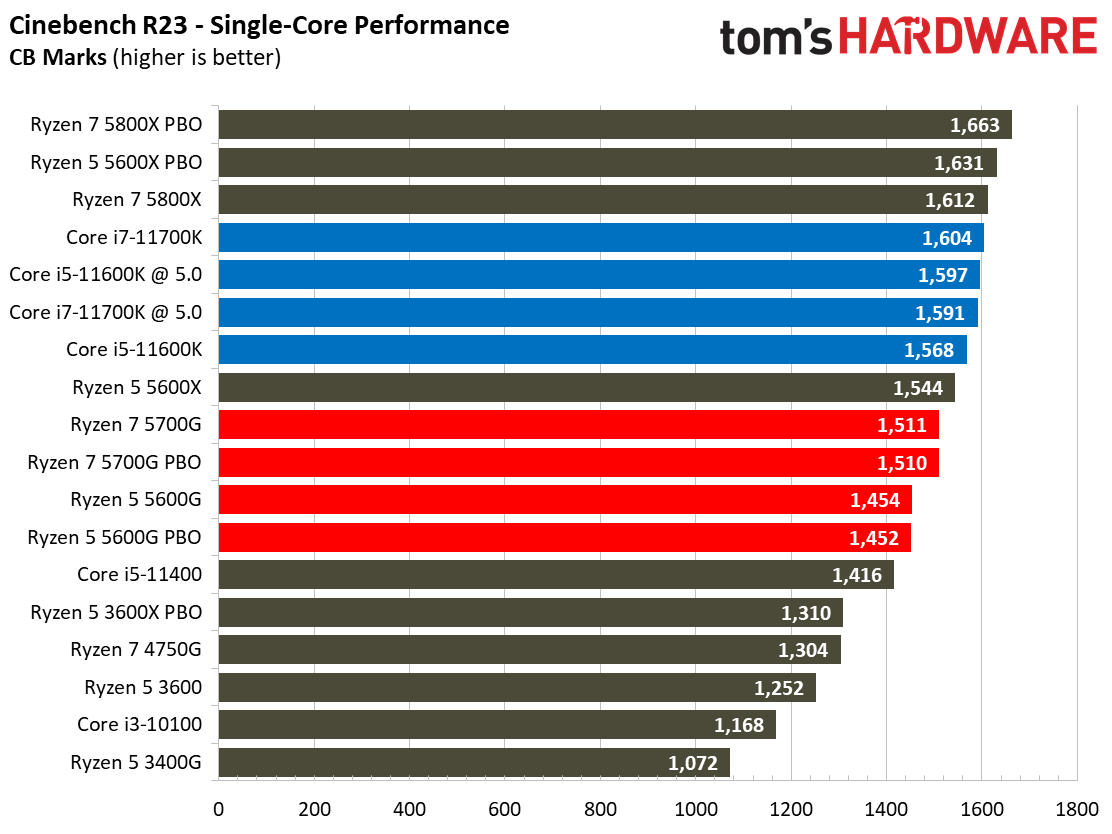
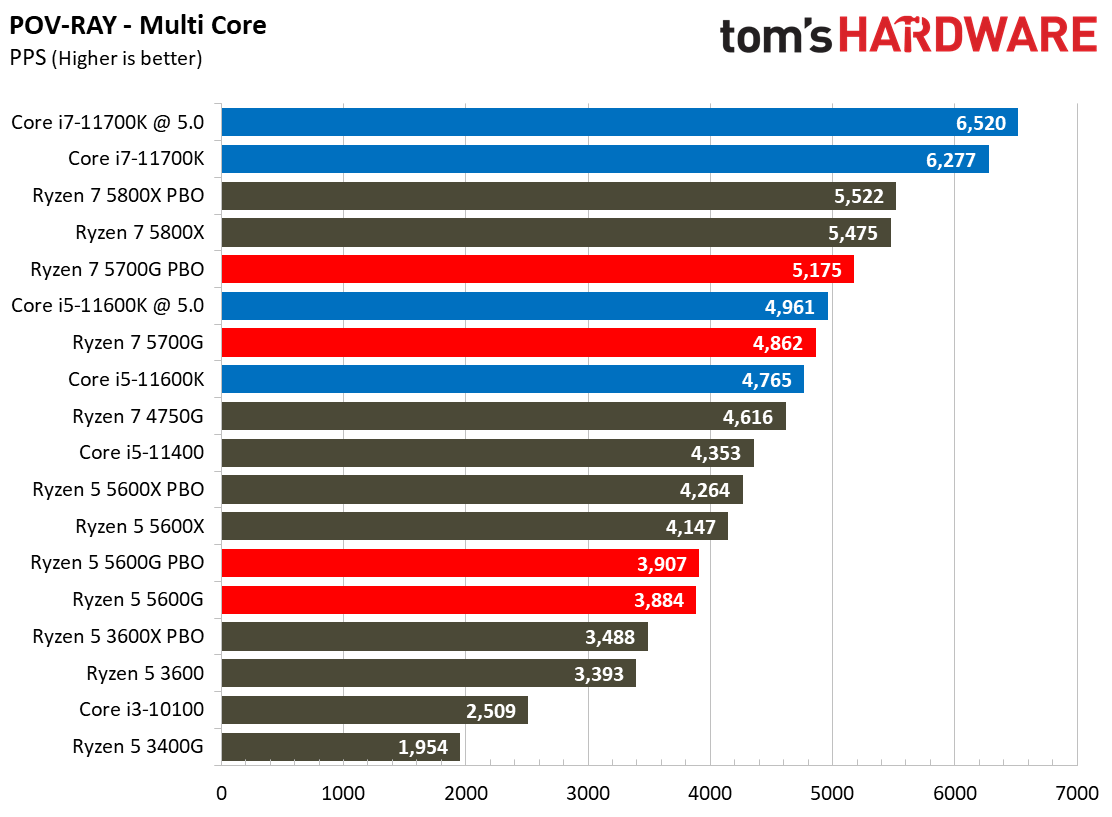
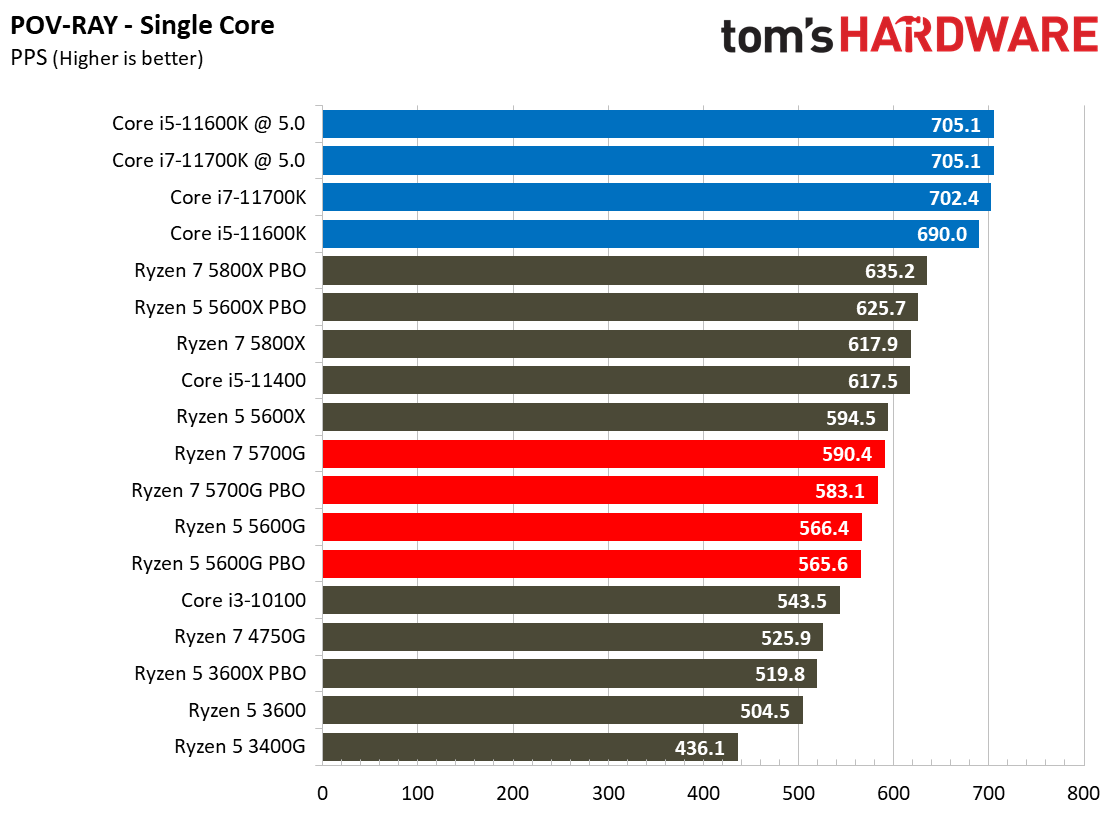
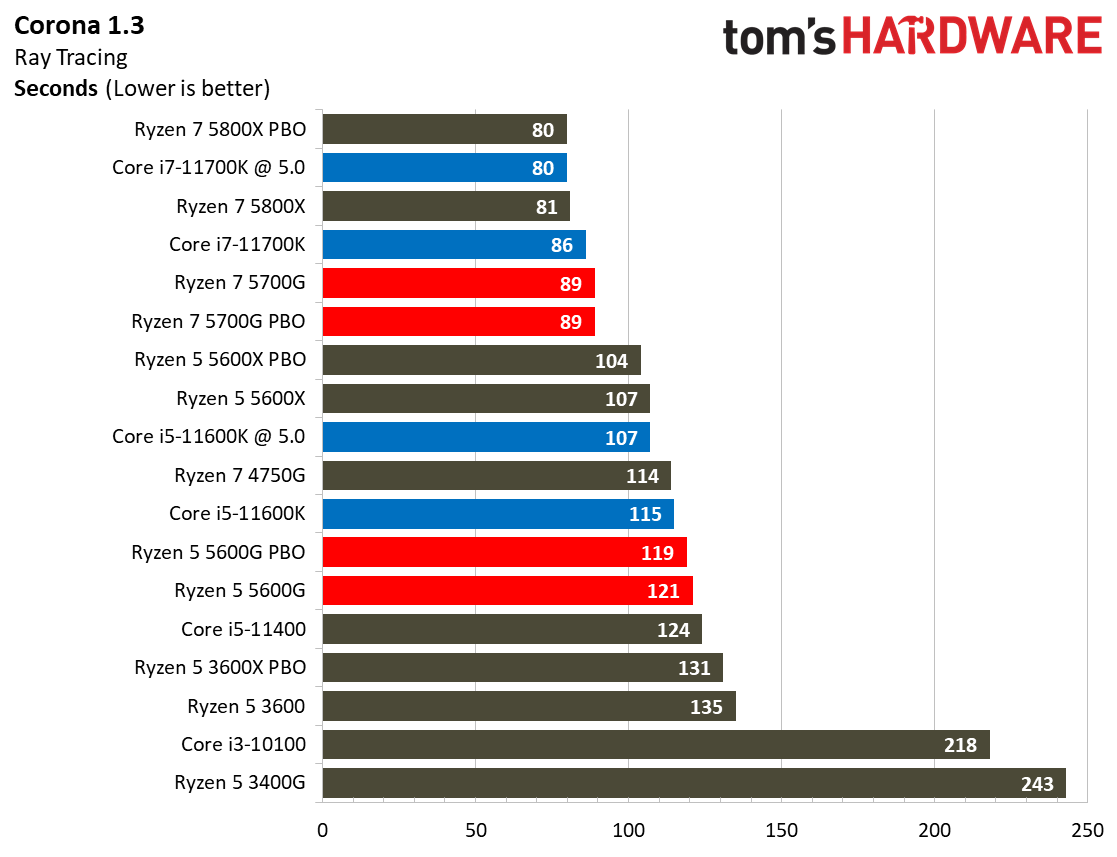
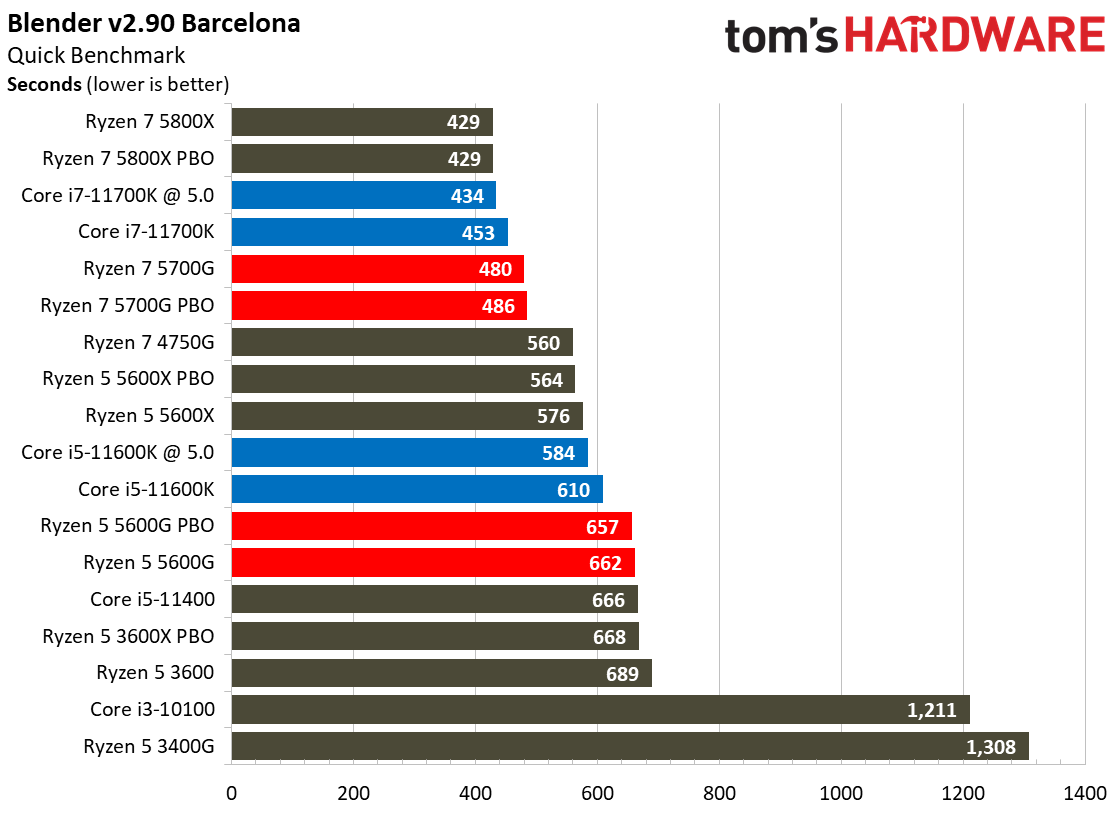
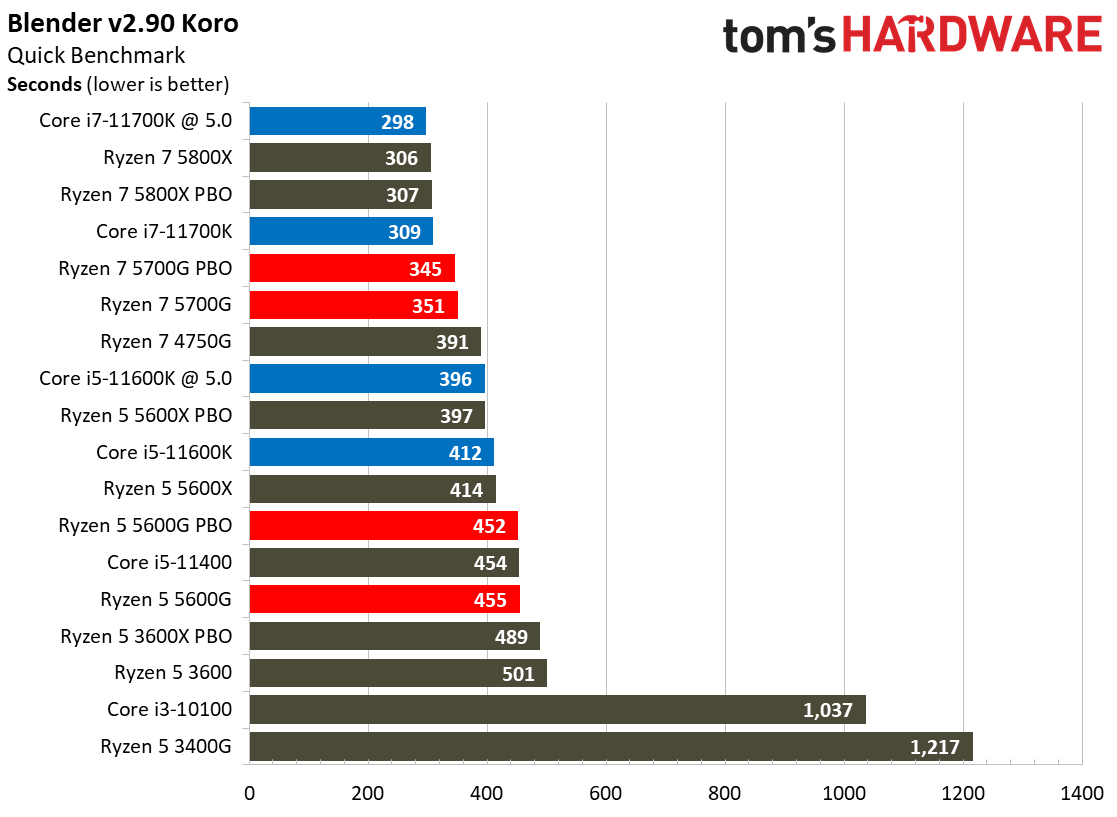
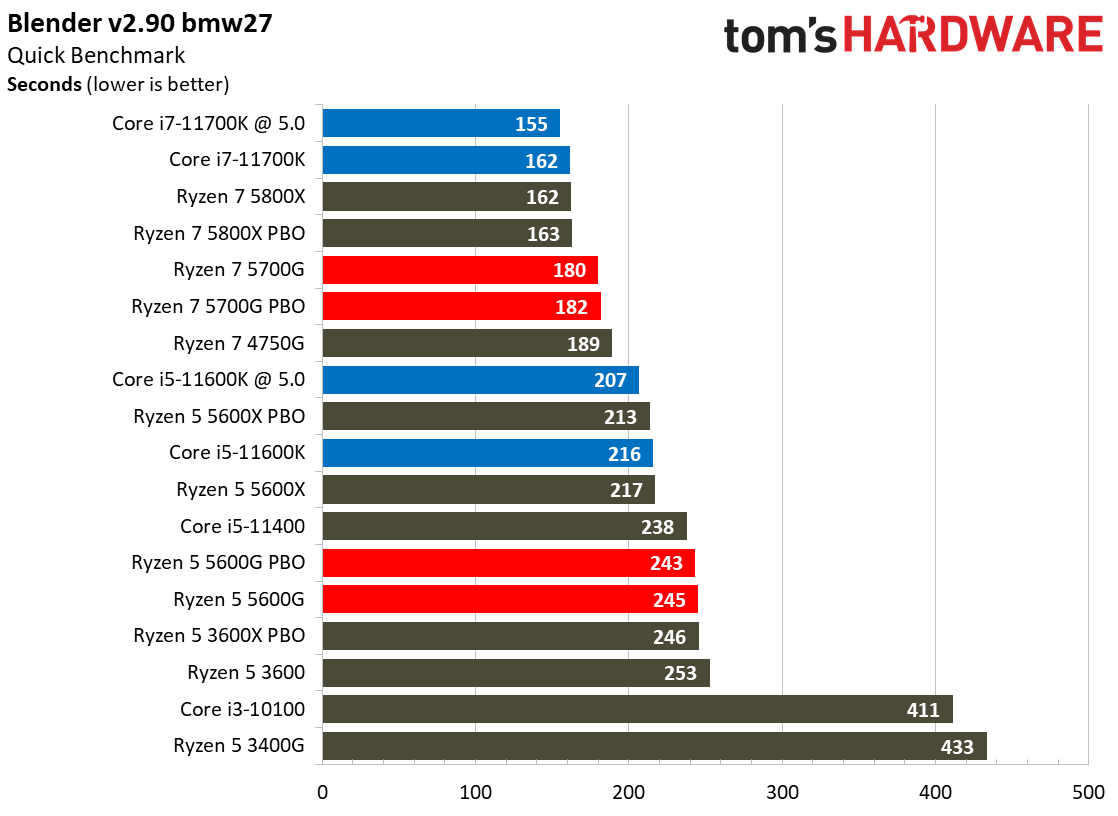
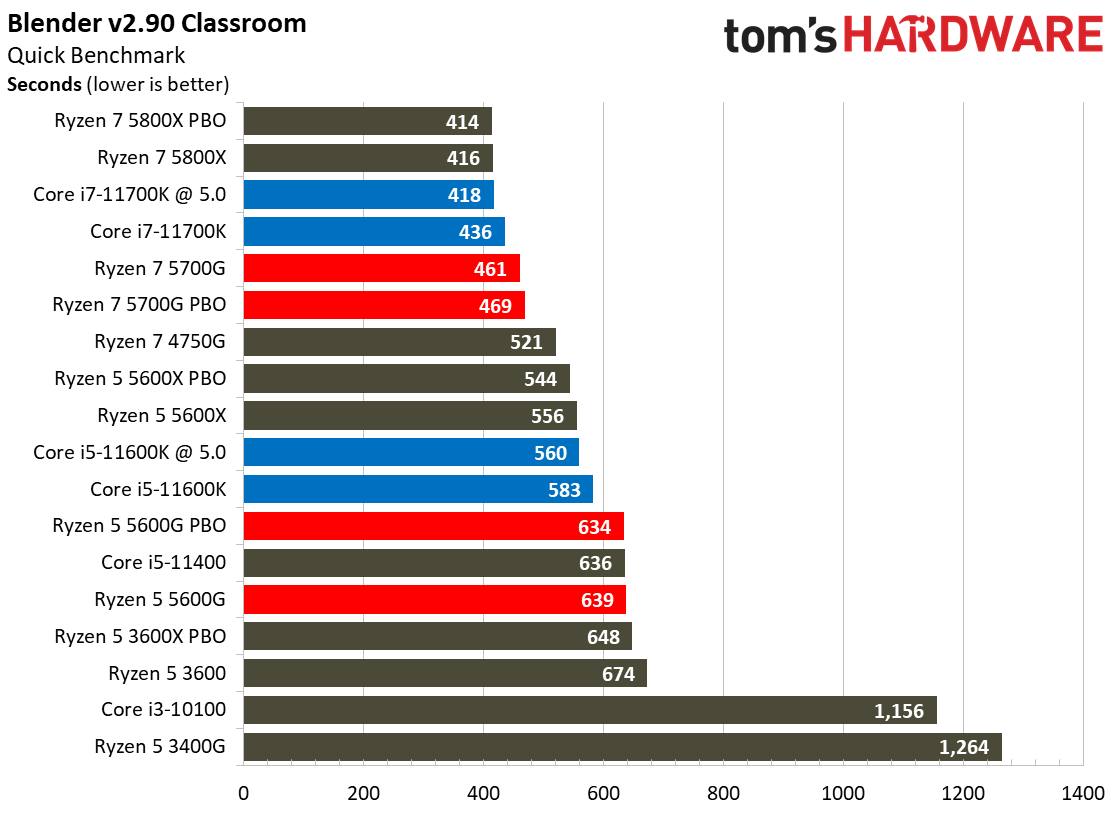
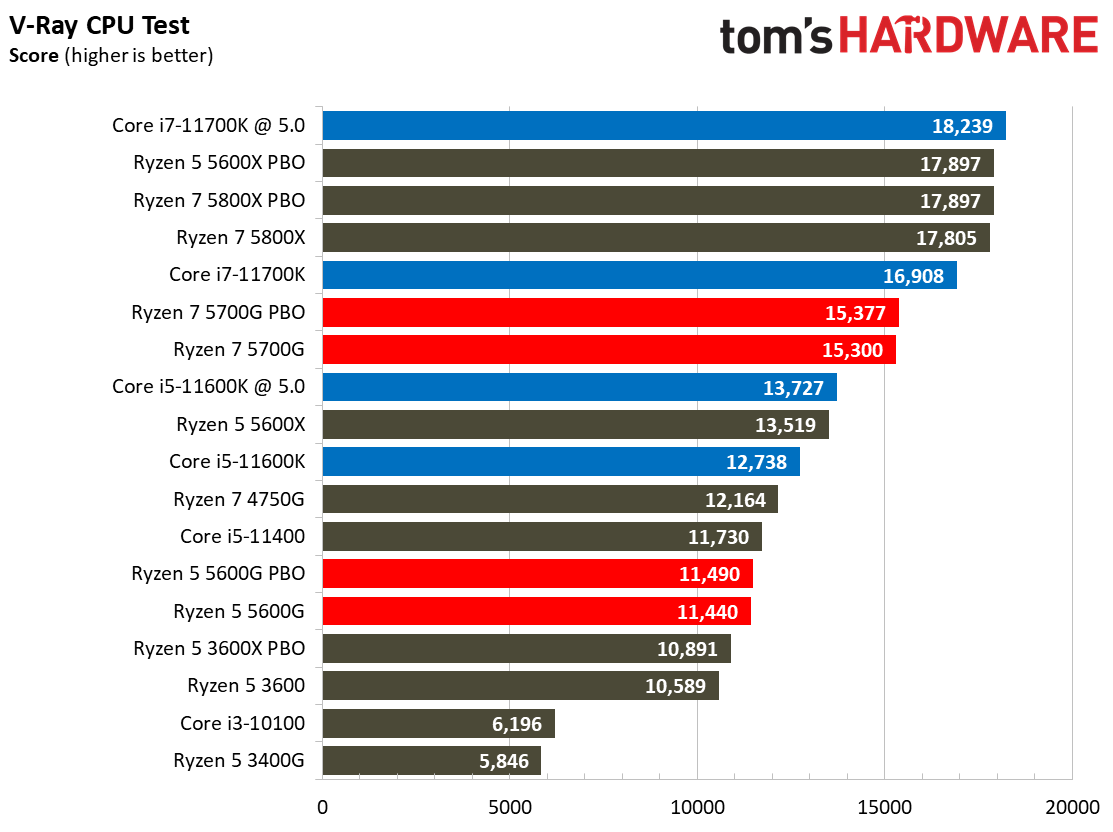
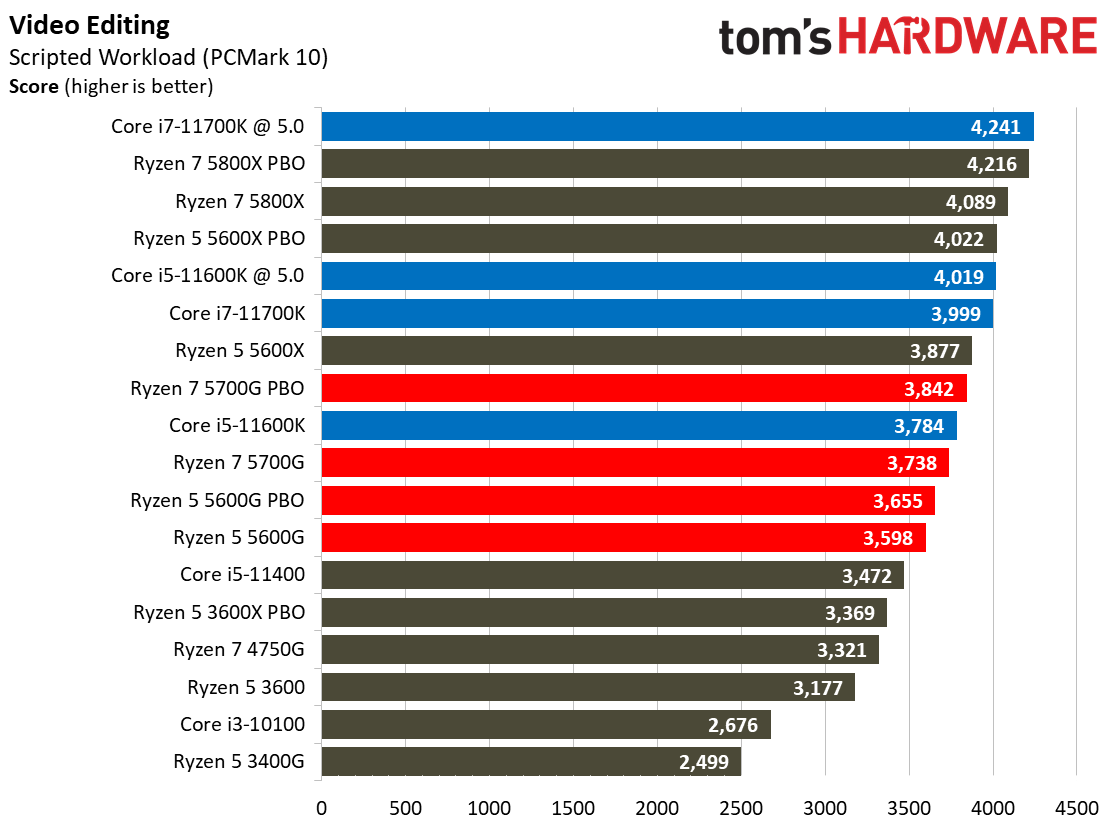
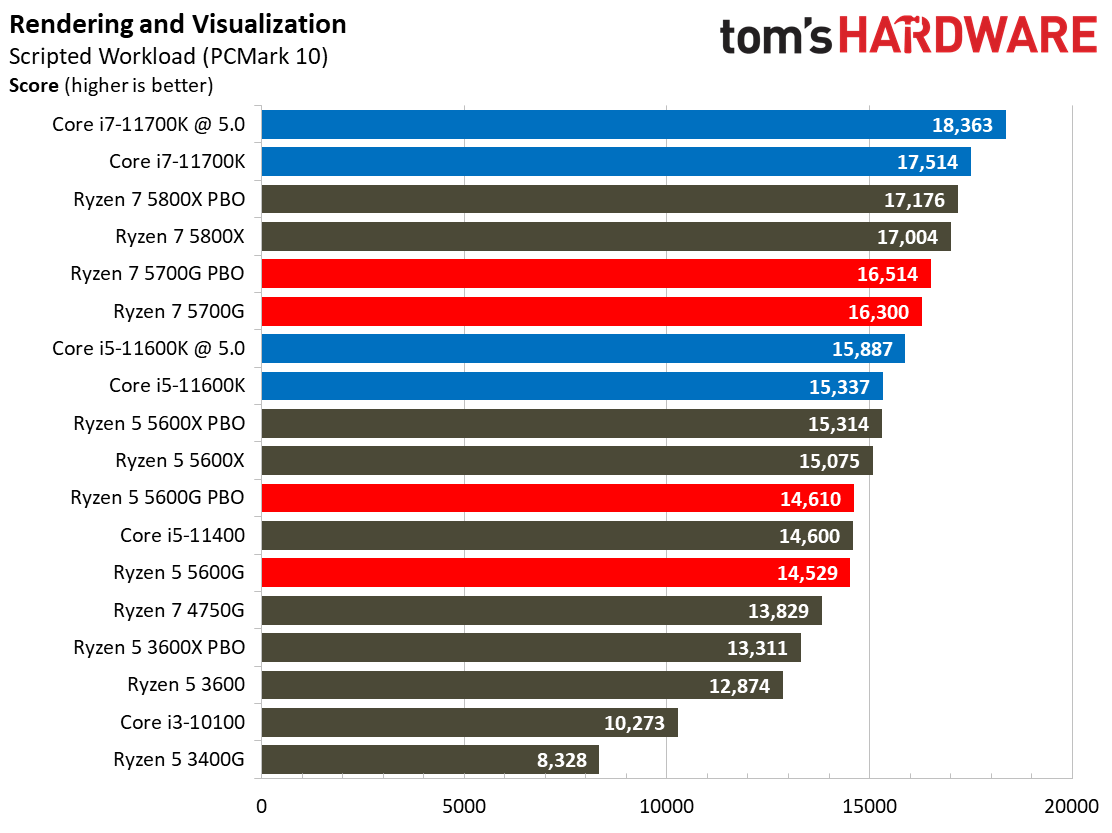
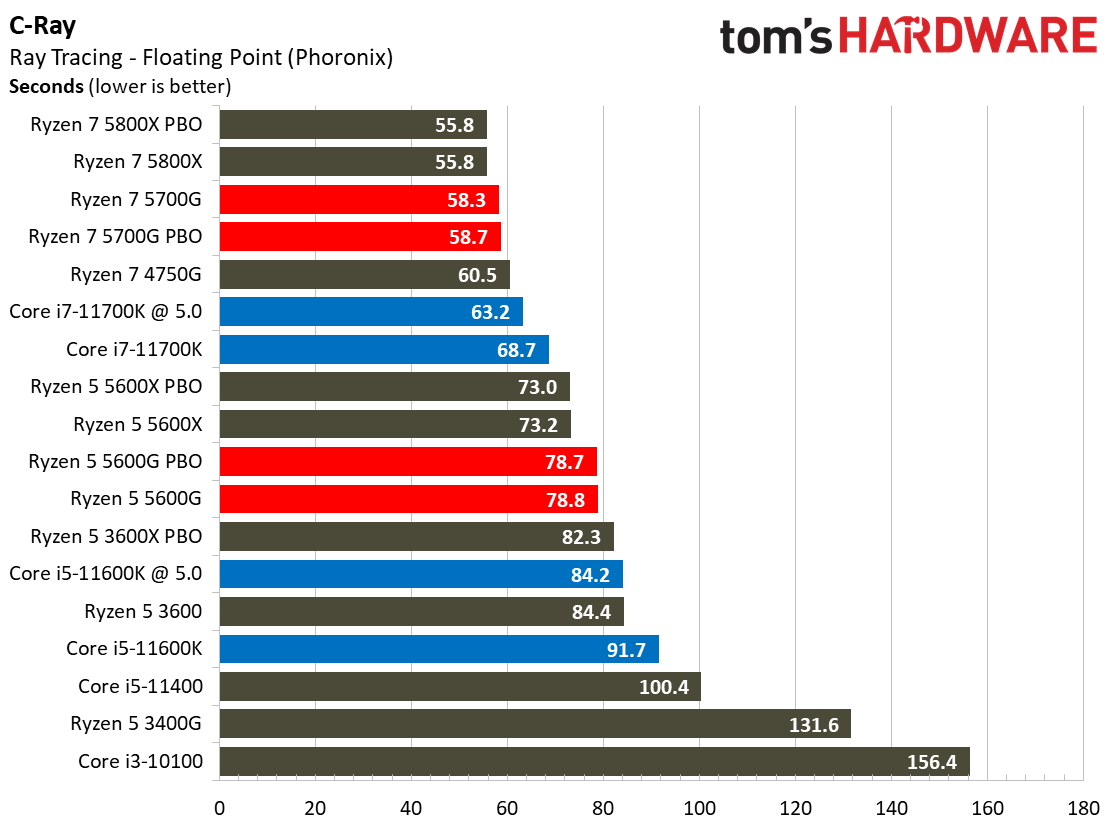
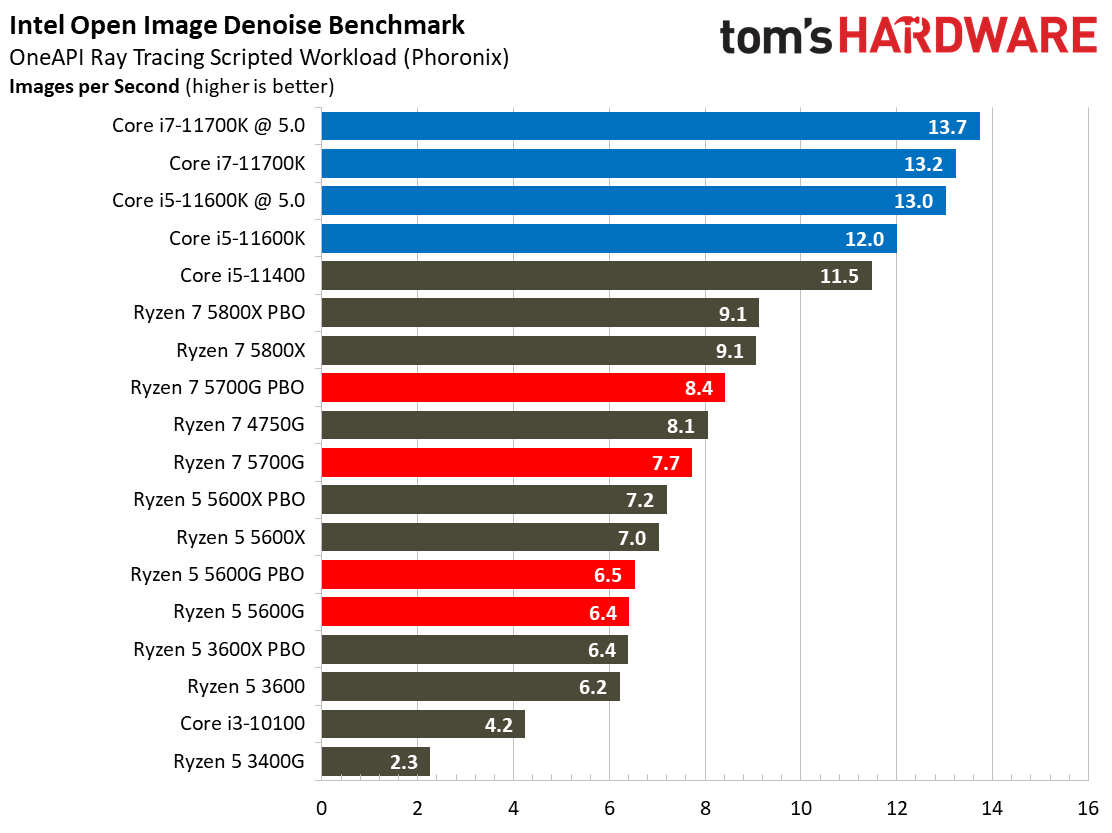
Remember, the Ryzen 5 3400G is the only other APU available at retail. The chip trails its more modern counterparts by massive margins in almost all of these threaded workloads, underlining that the 5700G is a massive step forward in terms of AMD's widely available silicon. You could go the extra mile and score a 4750G-powered OEM system, but stepping up to the 5700G's Zen 3 CPU cores makes much more sense for these types of applications.
Things aren't as rosy when we compared the 5700G to the Rocket Lake chips, though. The Core i7-11700K delivers quite a bit more performance in these threaded workloads, but it does come with a higher price tag.
Encoding Benchmarks on AMD Ryzen 7 5700G
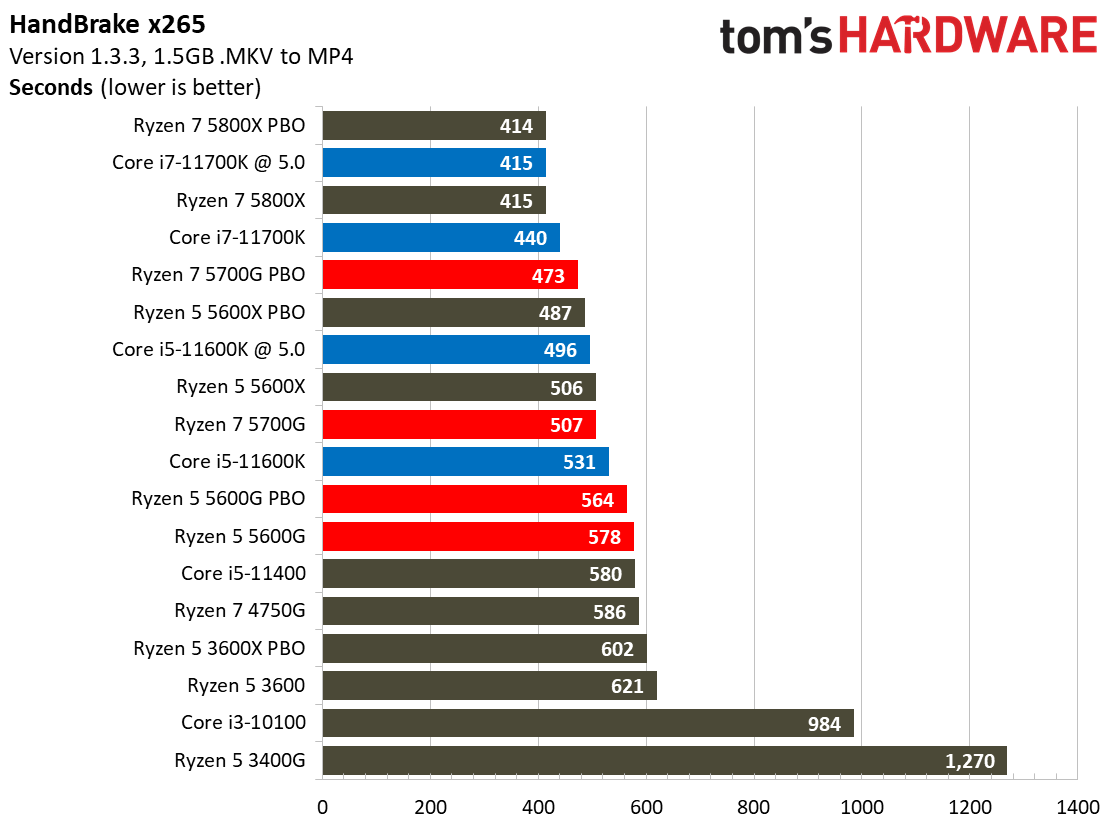
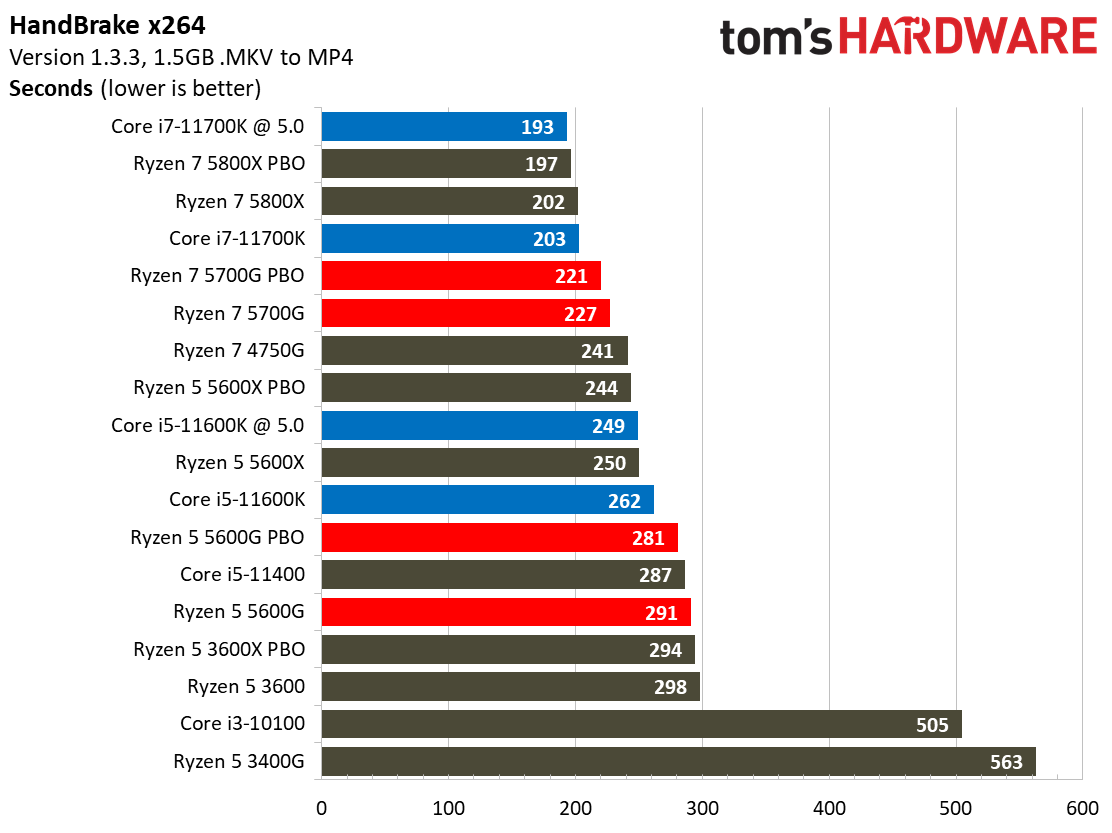
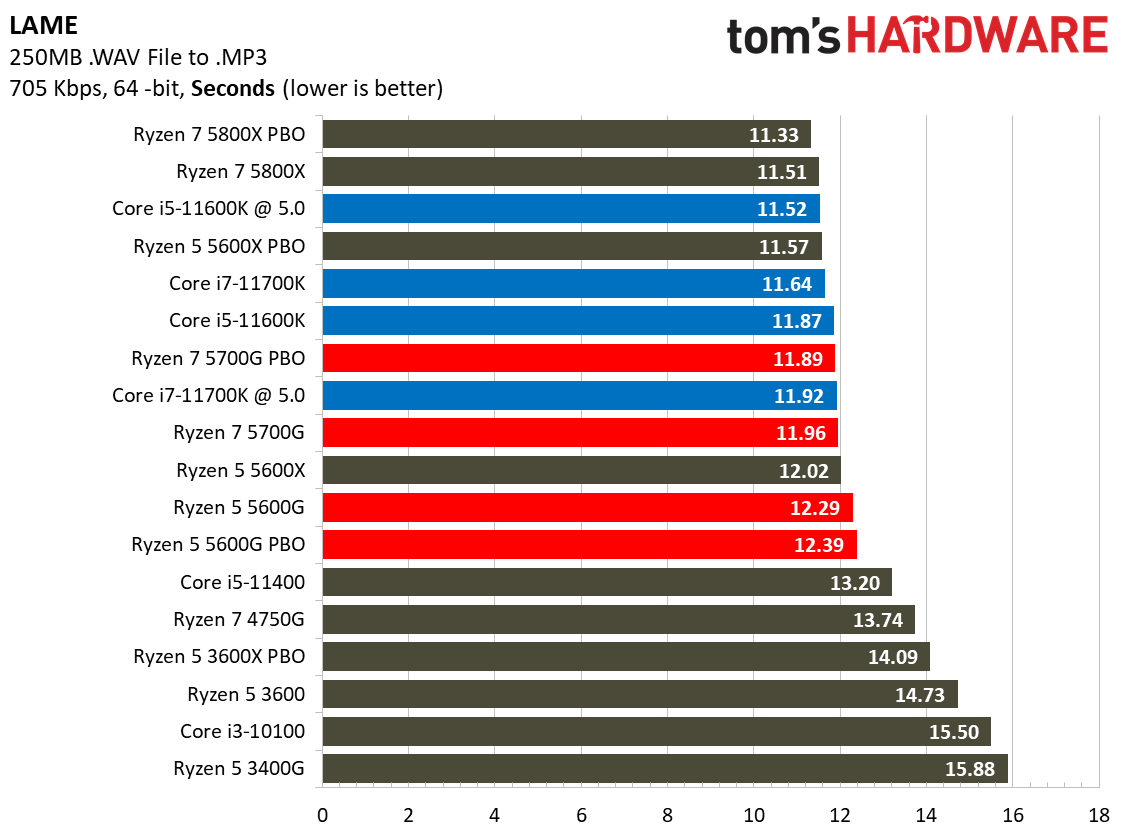
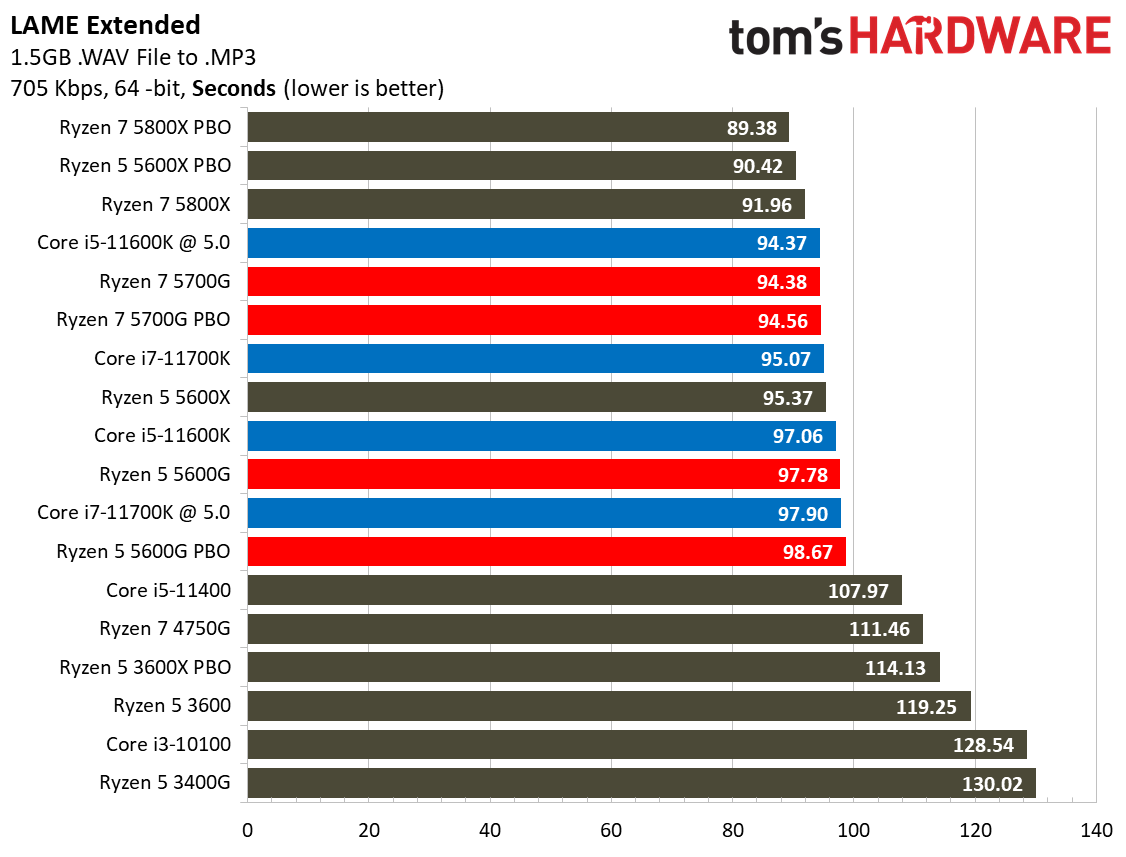
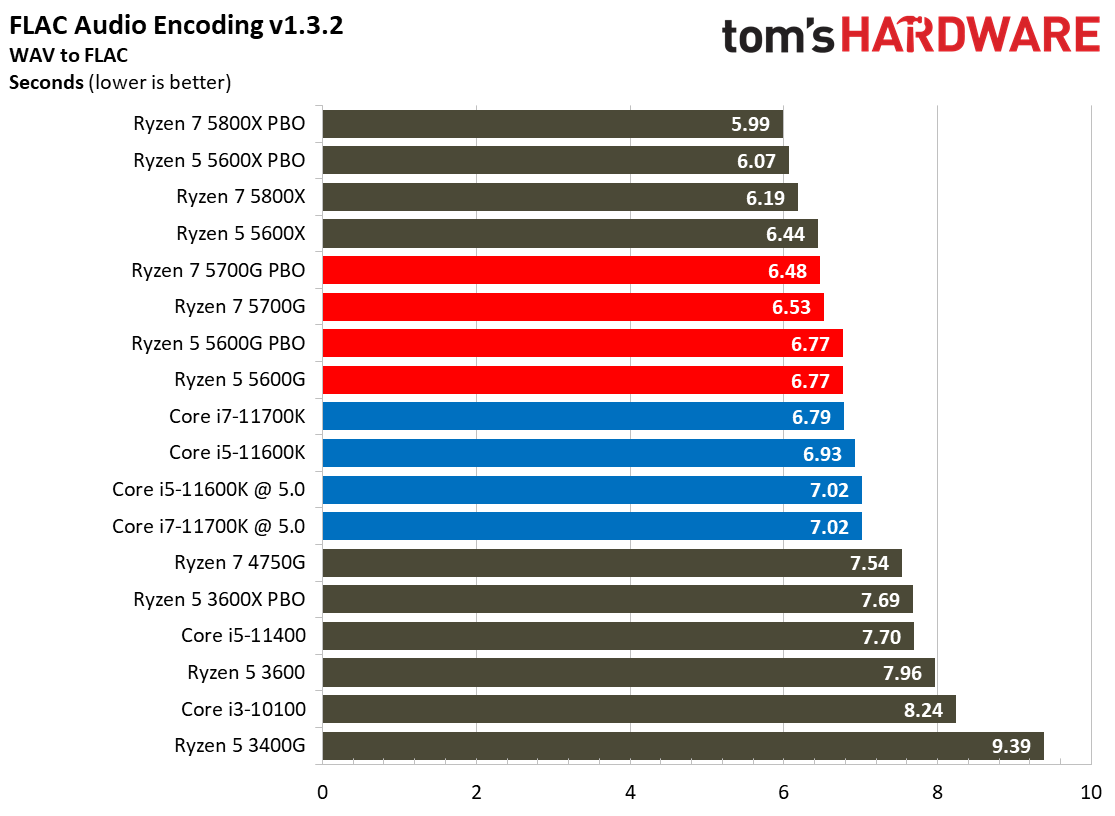
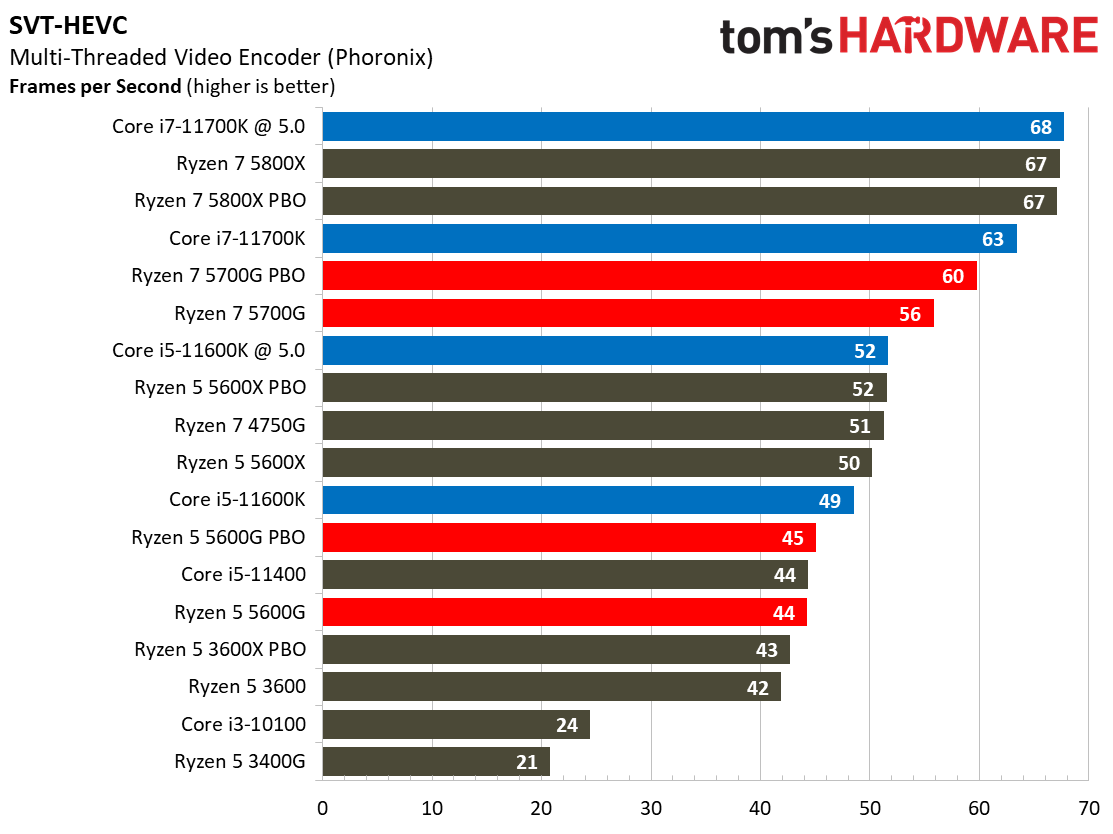
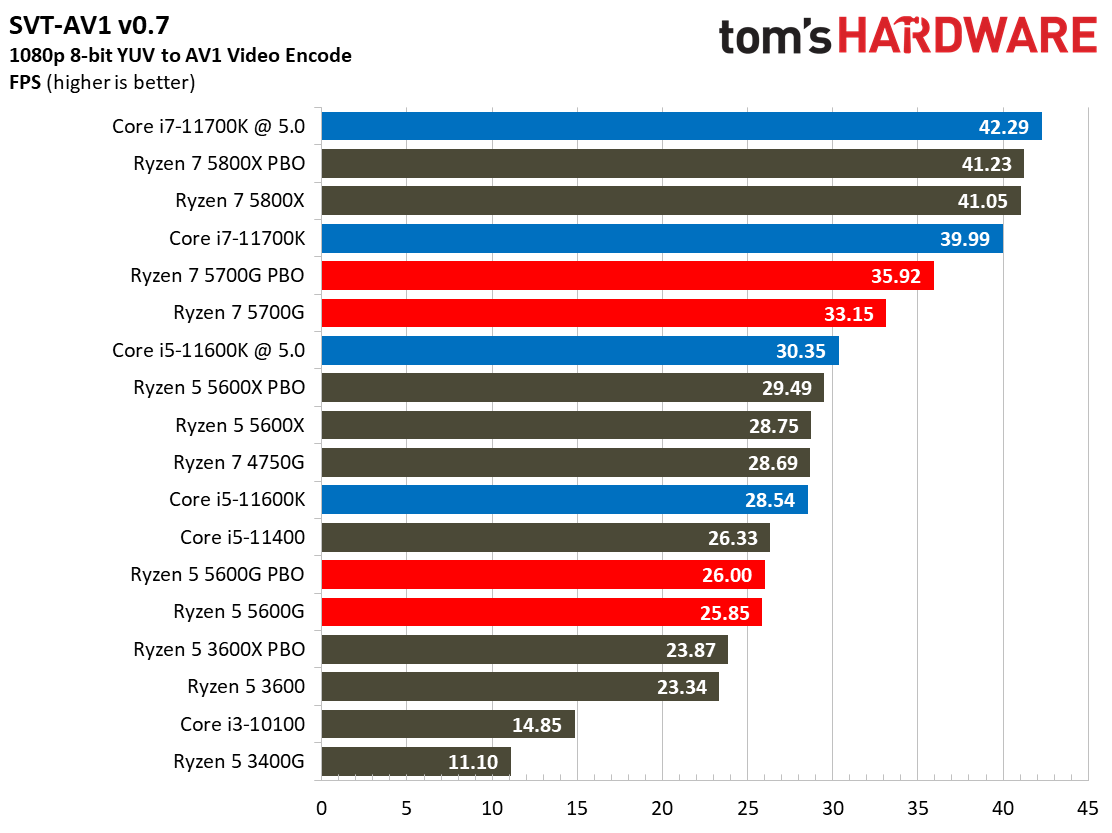
Our encoding tests include benchmarks that respond best to single-threaded performance, like the quintessential LAME and FLAC examples, but the SVT-AV1 and SVT-HEVC tests represent a newer class of threaded encoders.
Again, we see massive generational leaps for AMD's APU tech, and the 5700G more than holds its own in our LAME and Flac tests. The 5700G beats the stock Rocket Lake chips in the extended tests that cause the 11700K and 11600K to drop out of their turbo window and operate at base frequencies.
Get Tom's Hardware's best news and in-depth reviews, straight to your inbox.
We test HandBrake in both AVX-light x264 and AVX-heavy x265 flavors. Relative to the Rocket Lake chips, the 5700G again carves out a reasonable position on the chart given its price point.
Office and Productivity on AMD Ryzen 7 5700G
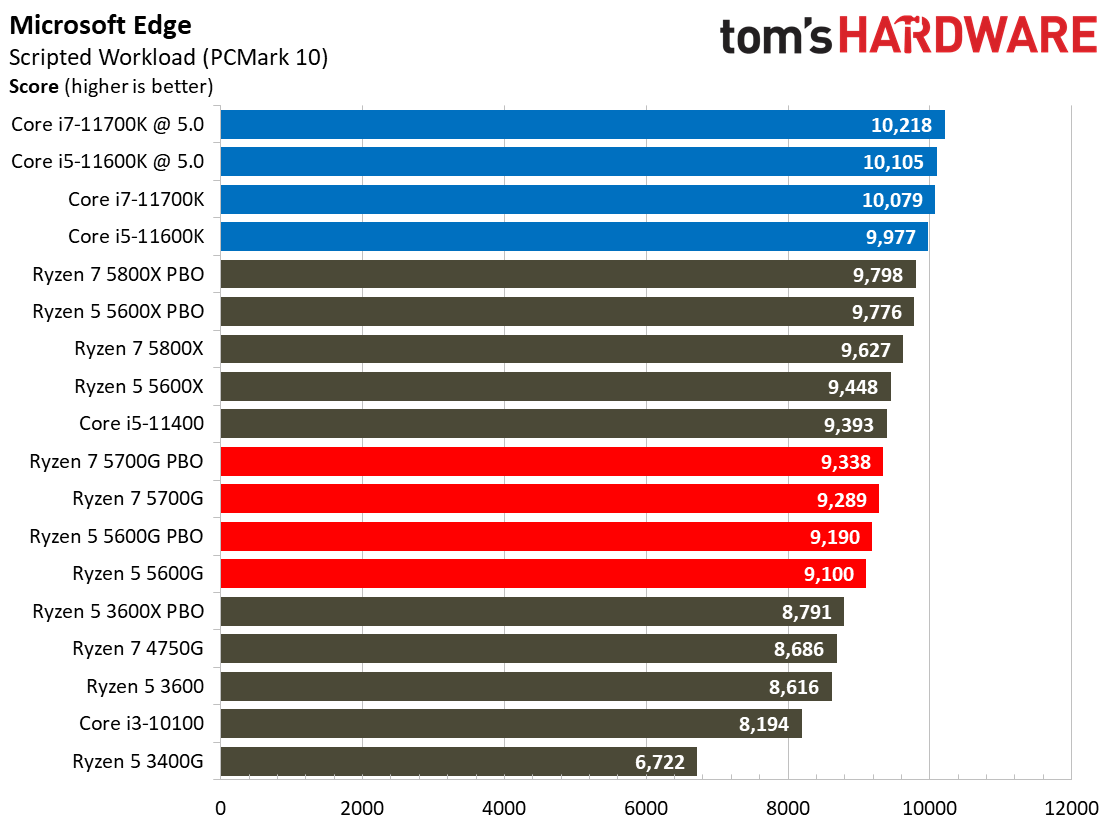
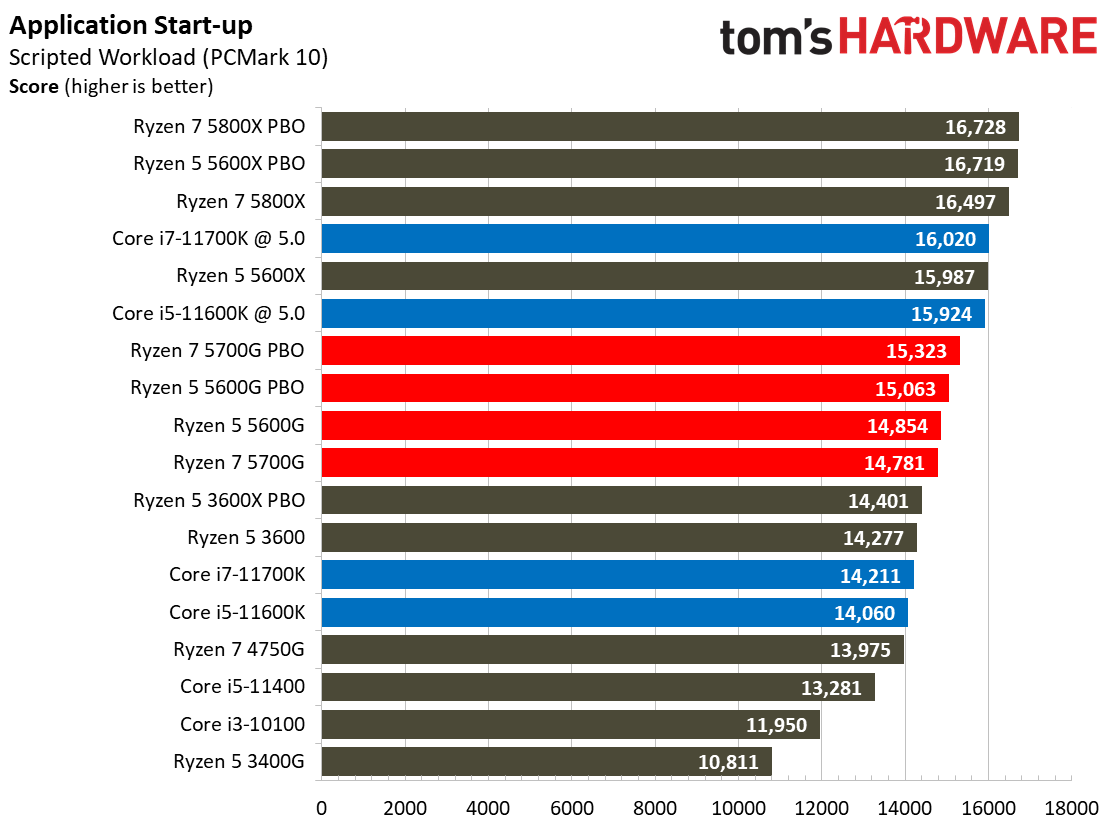
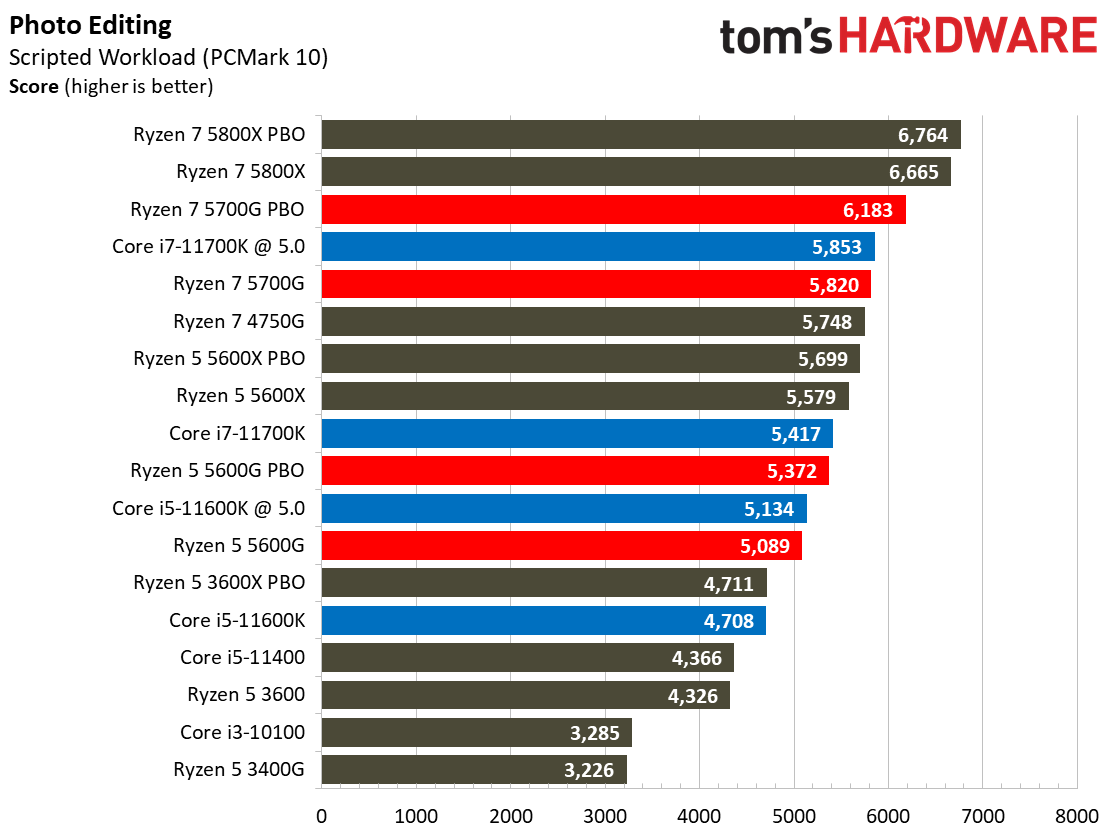
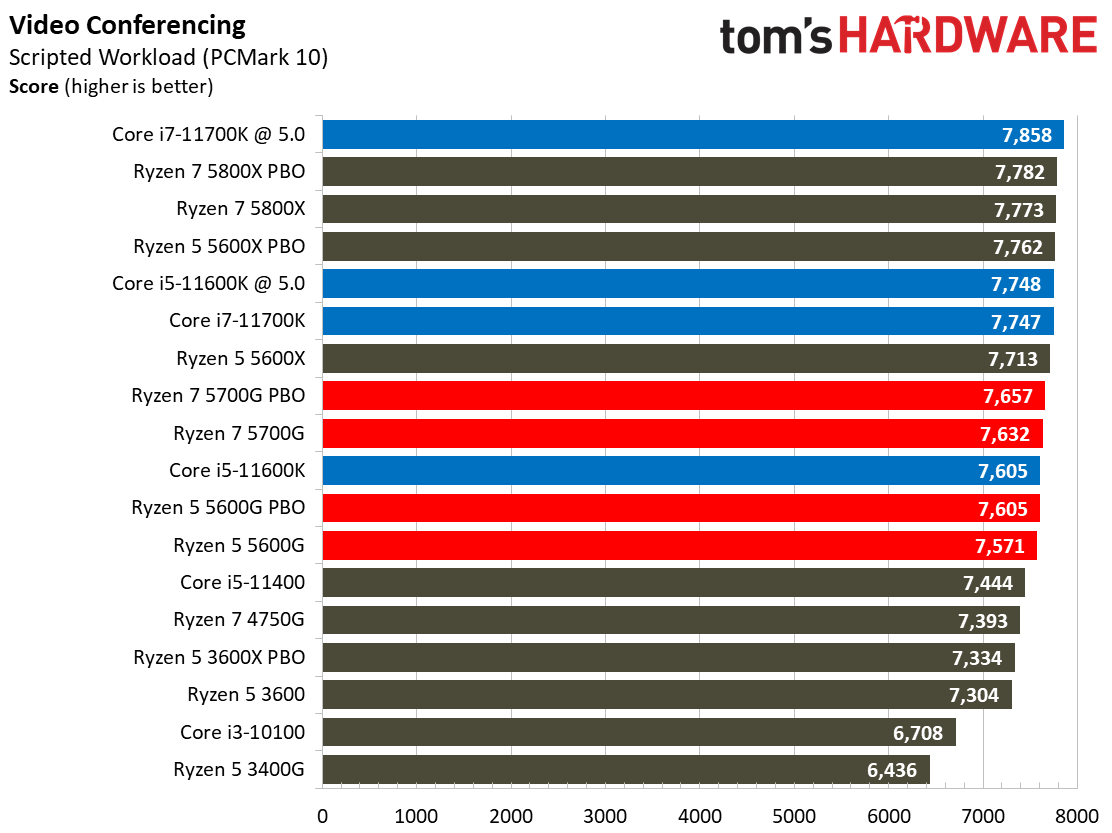
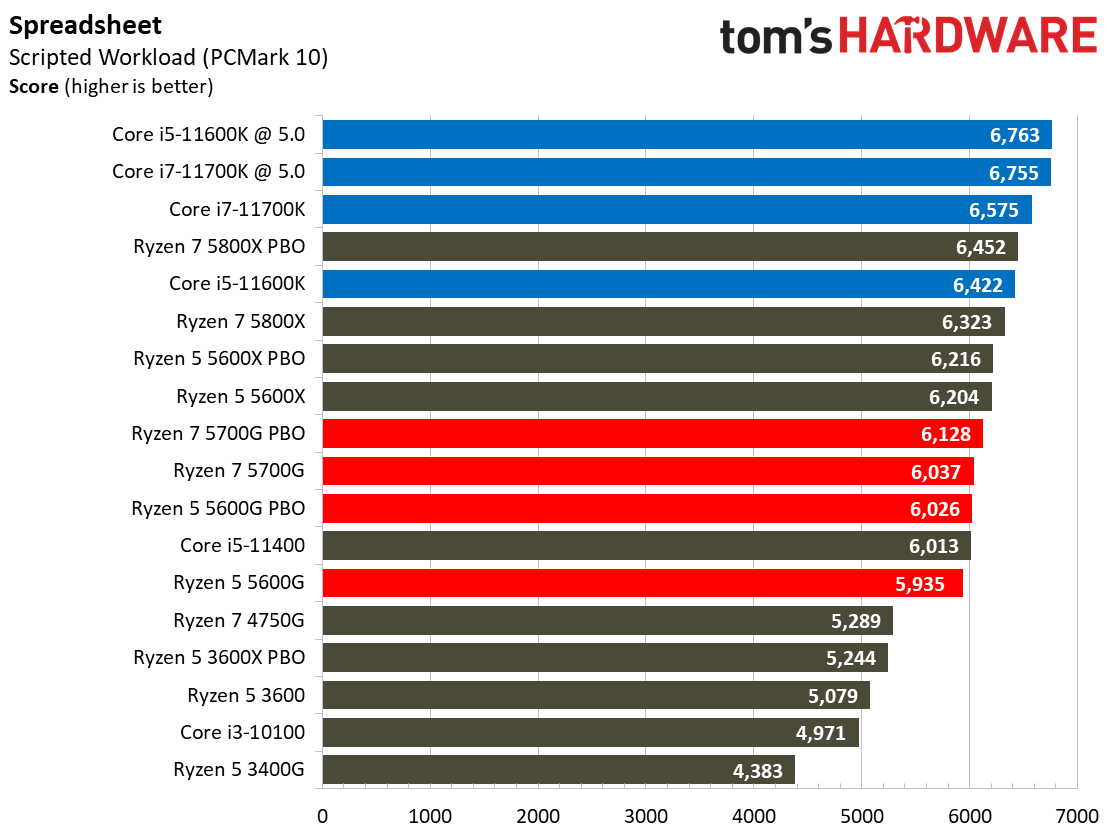
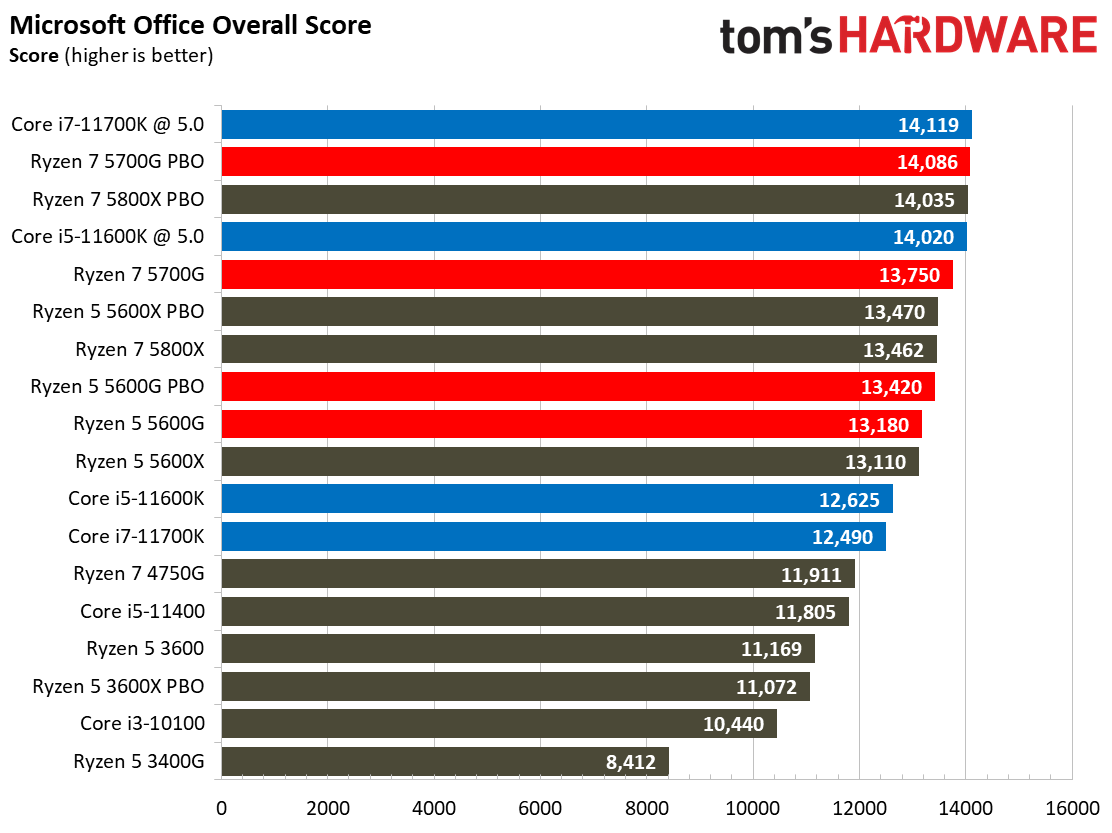
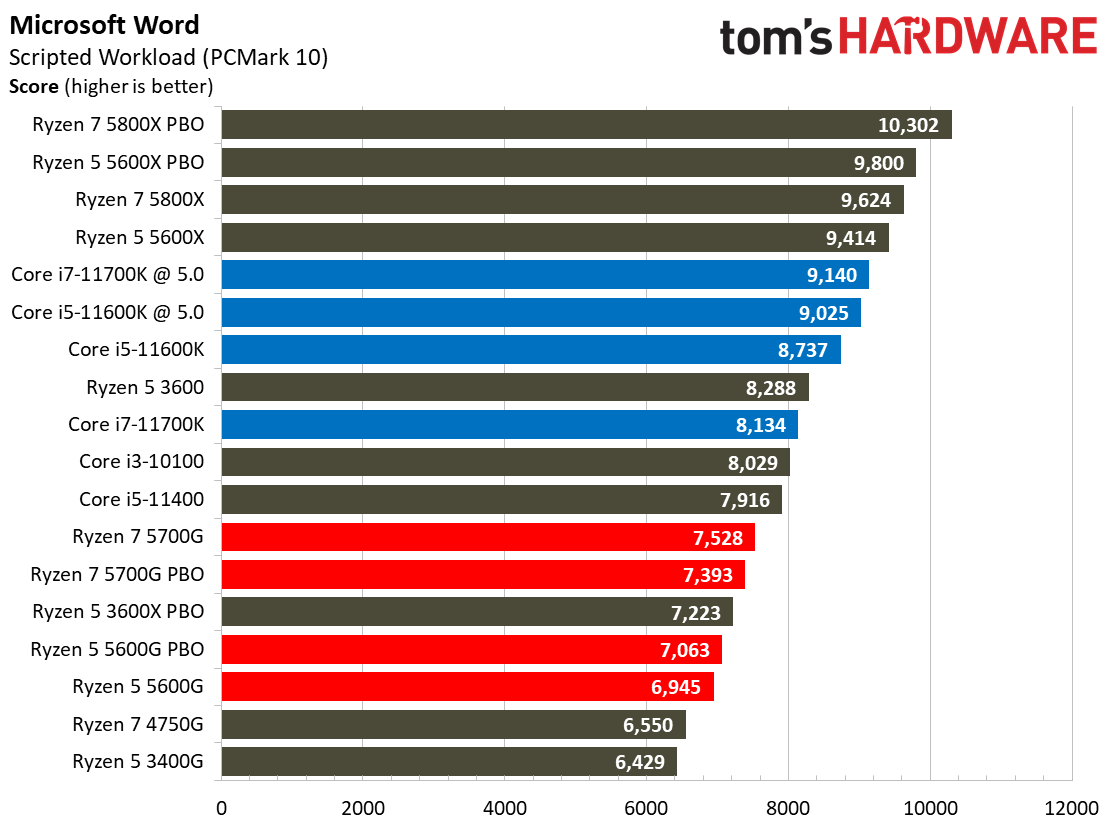
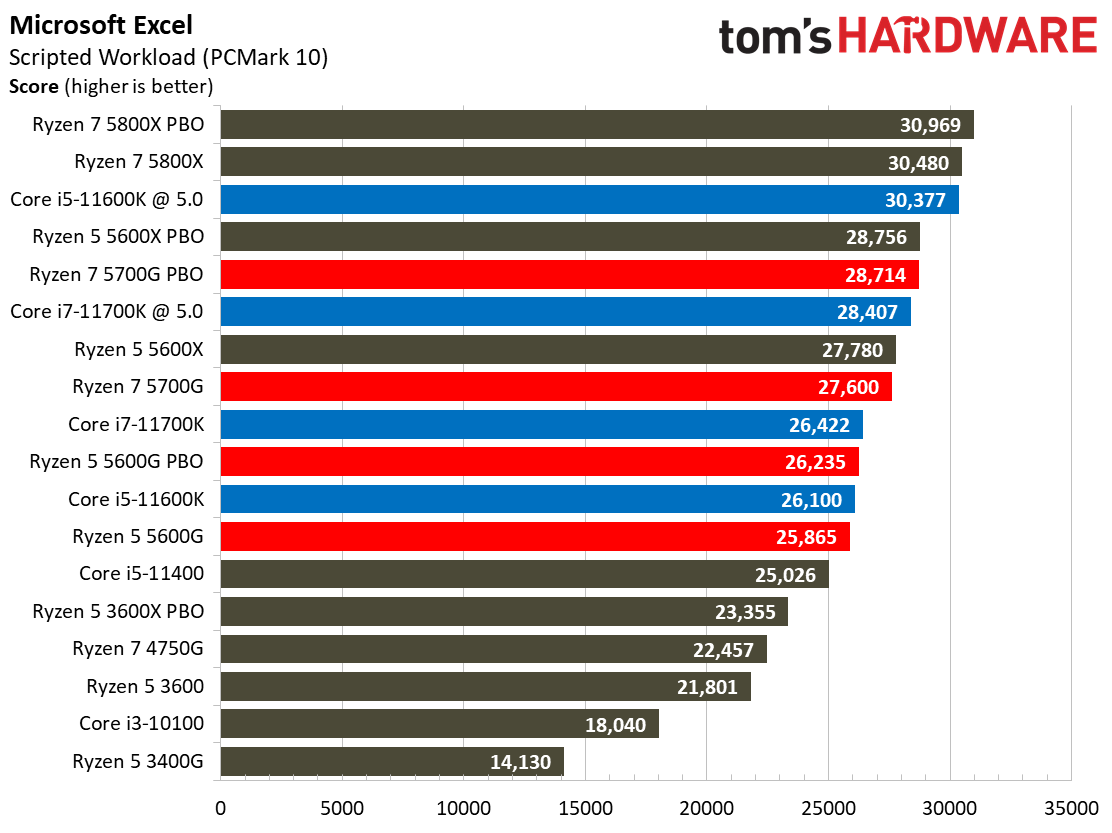
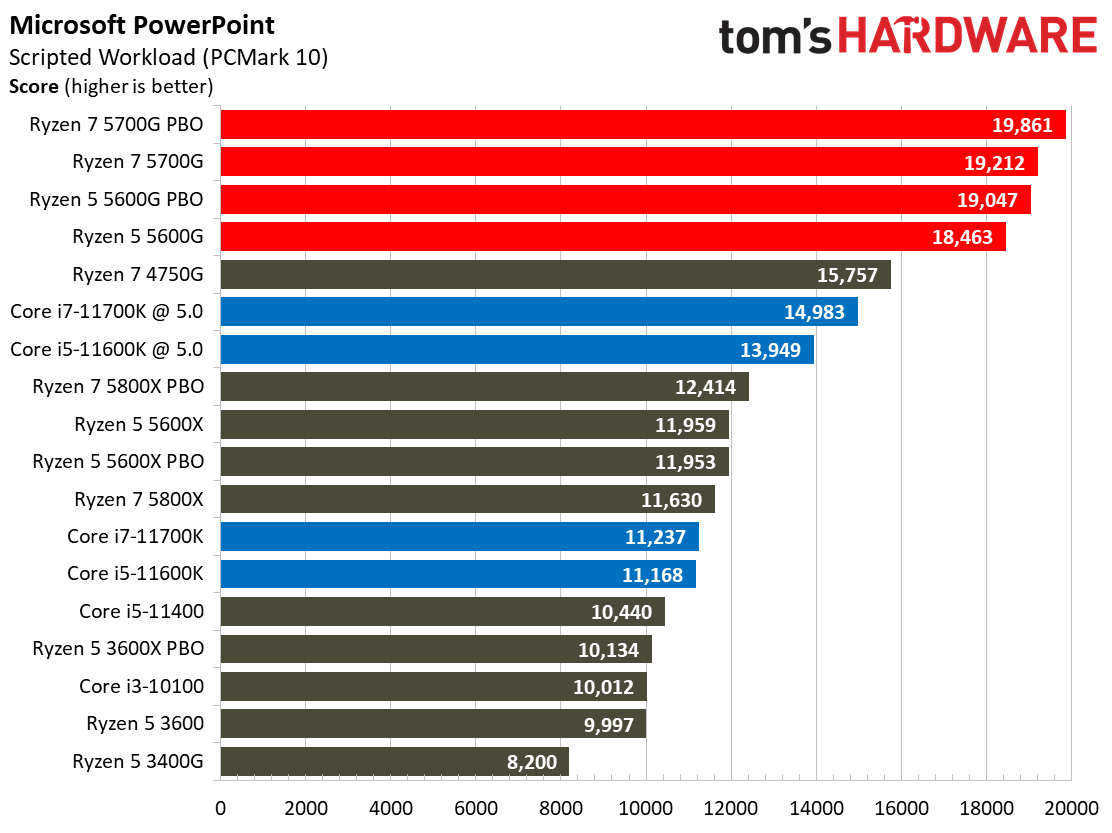
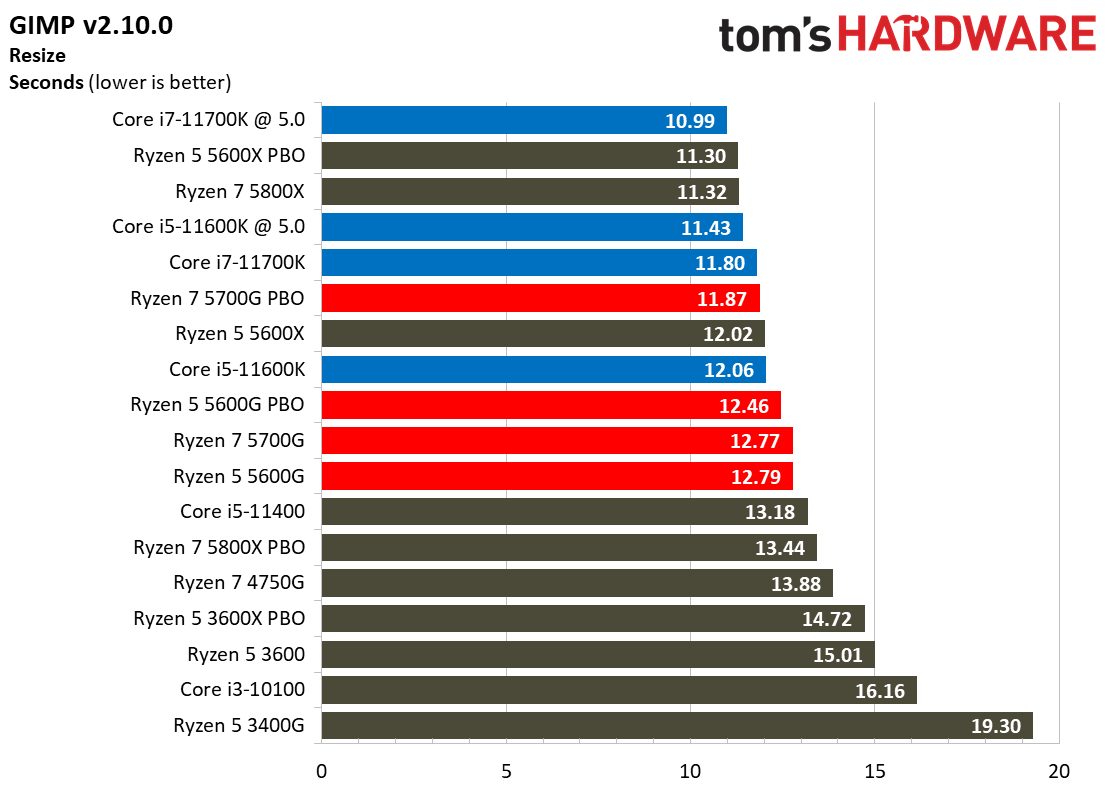
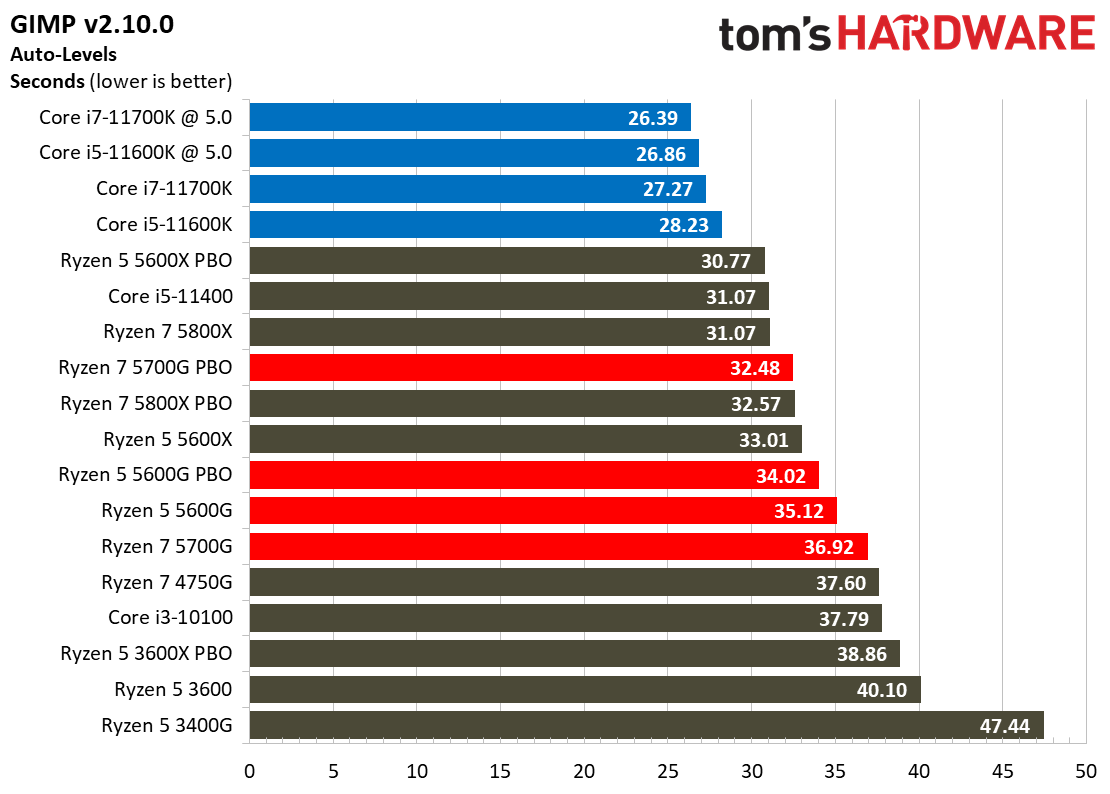
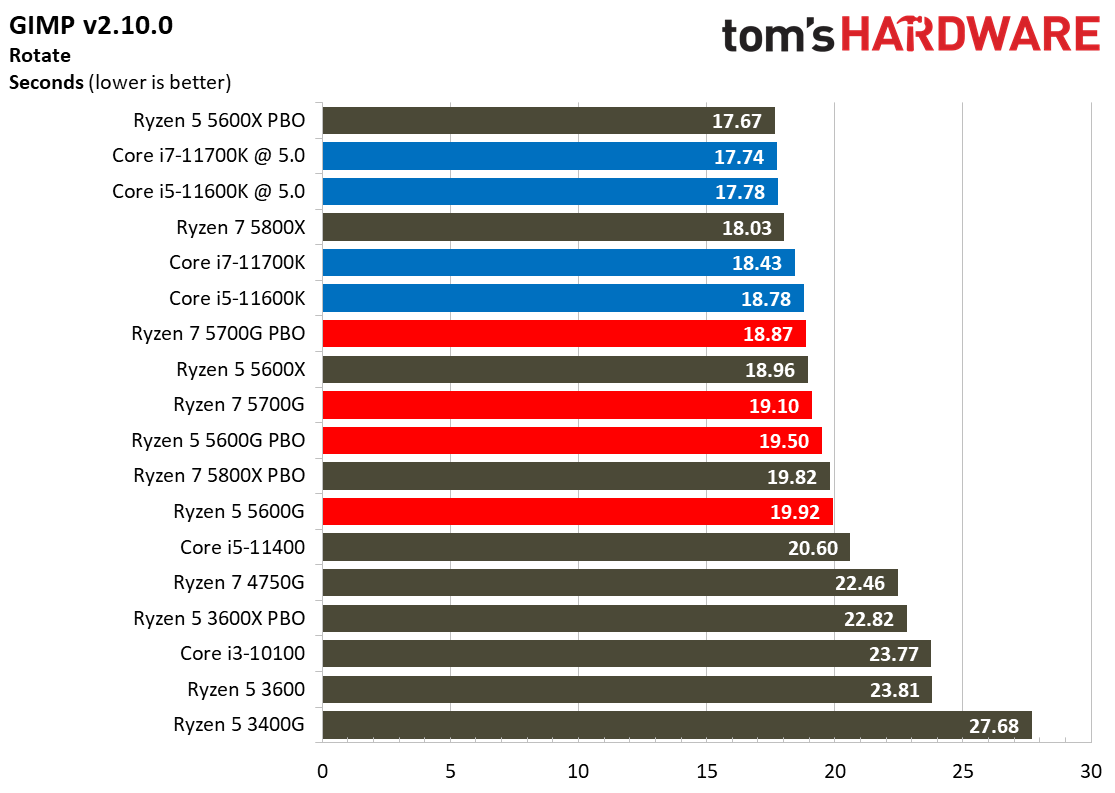
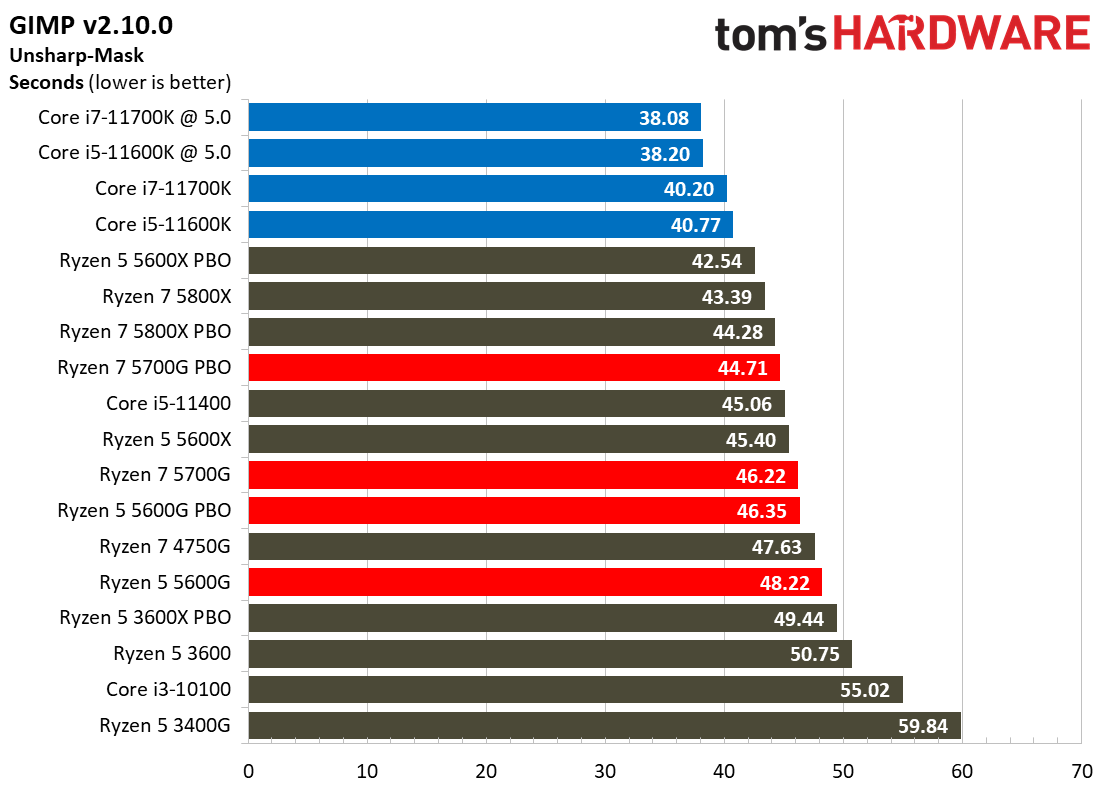
Yet another Chrome update has broken out automated web browser benchmarks, and we're working to address that issue. That leaves us with PC Mark 10's built-in Edge test to quantify performance, but be aware that this test responds more to threading than any other type of web browser benchmark.
Again, the 5700G takes strong steps forward in key areas that measure responsiveness, like the Application Start-Up benchmark. It also improves AMD's APU positioning quite drastically in the Microsoft Office benchmark suite.
Compilation, Compression, AVX Performance on AMD Ryzen 7 5700G
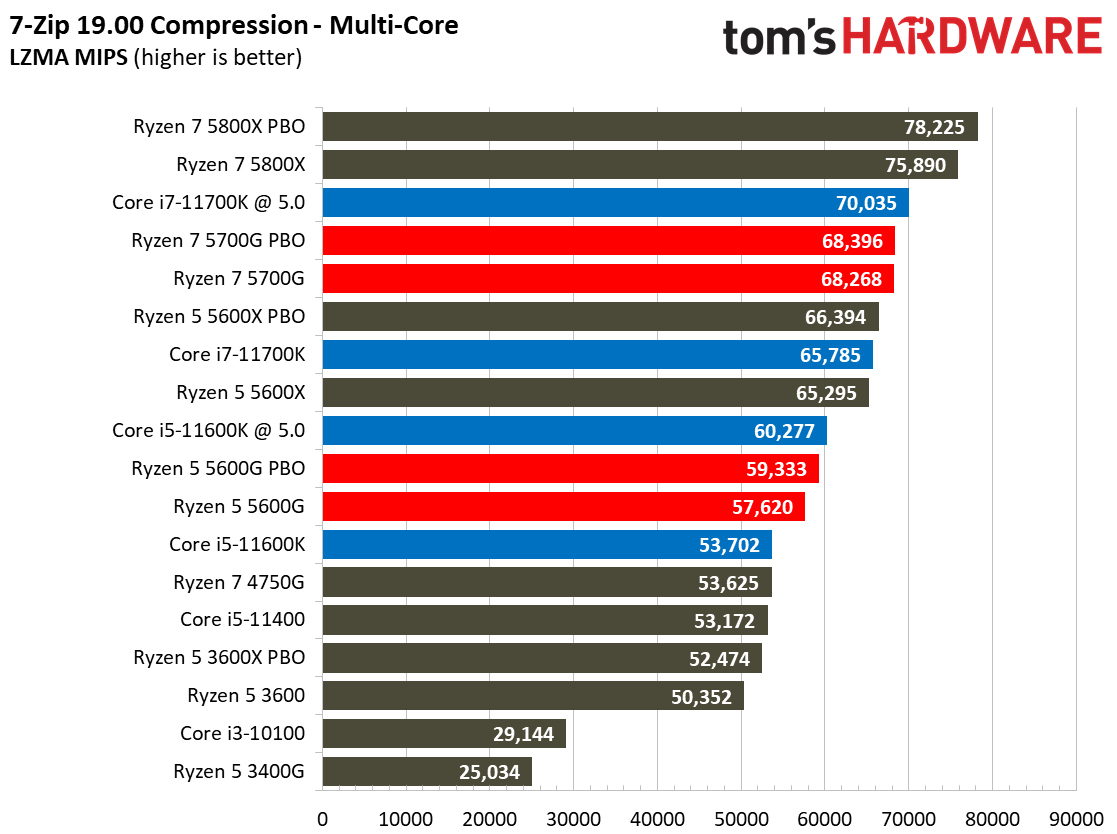
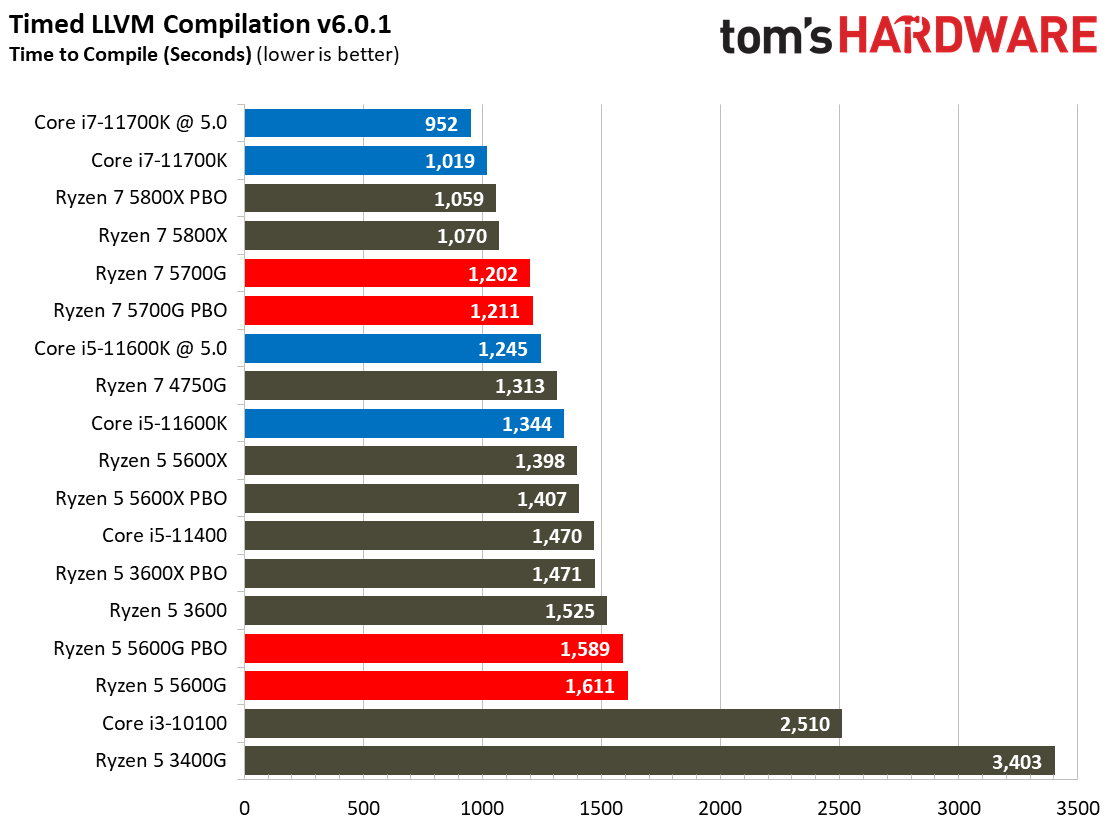
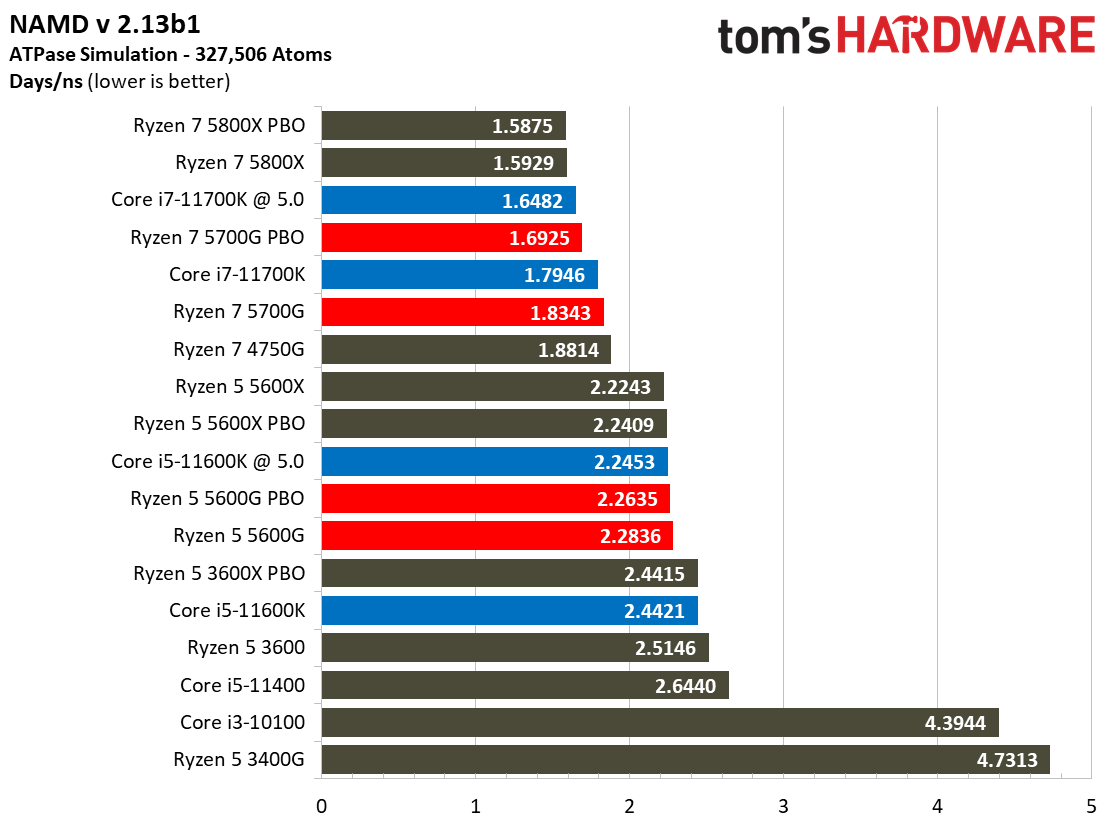
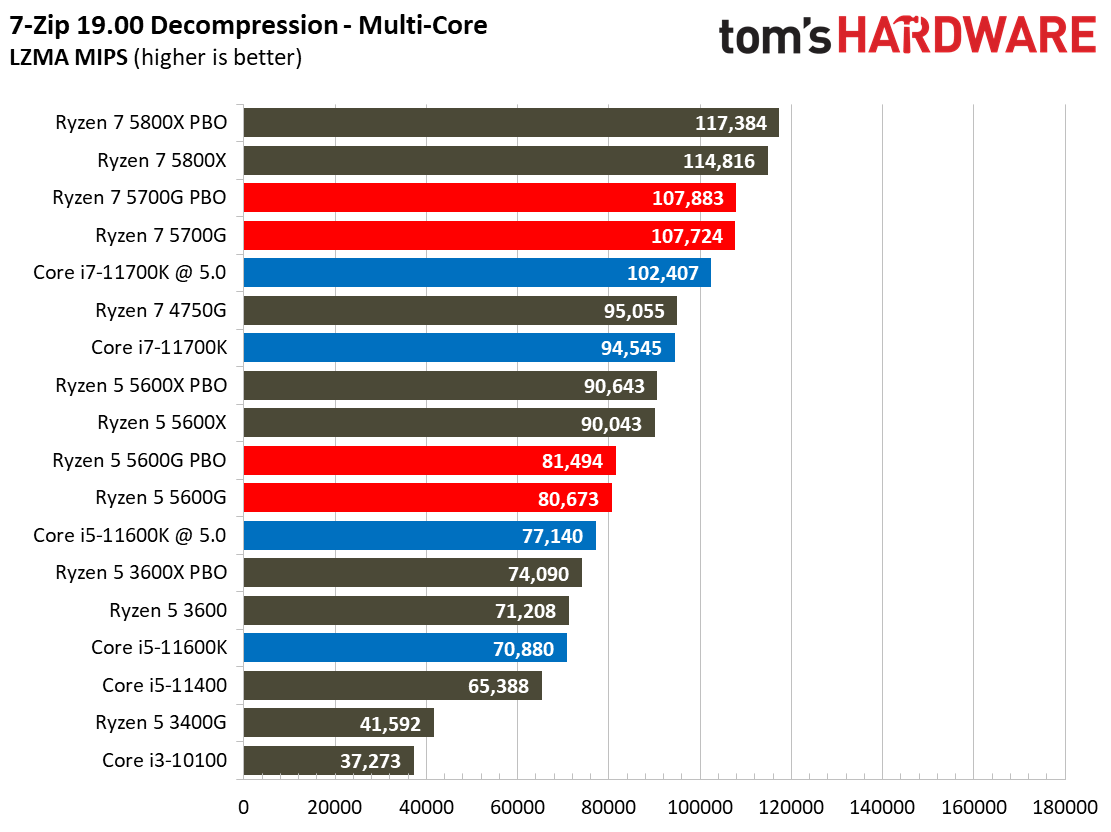
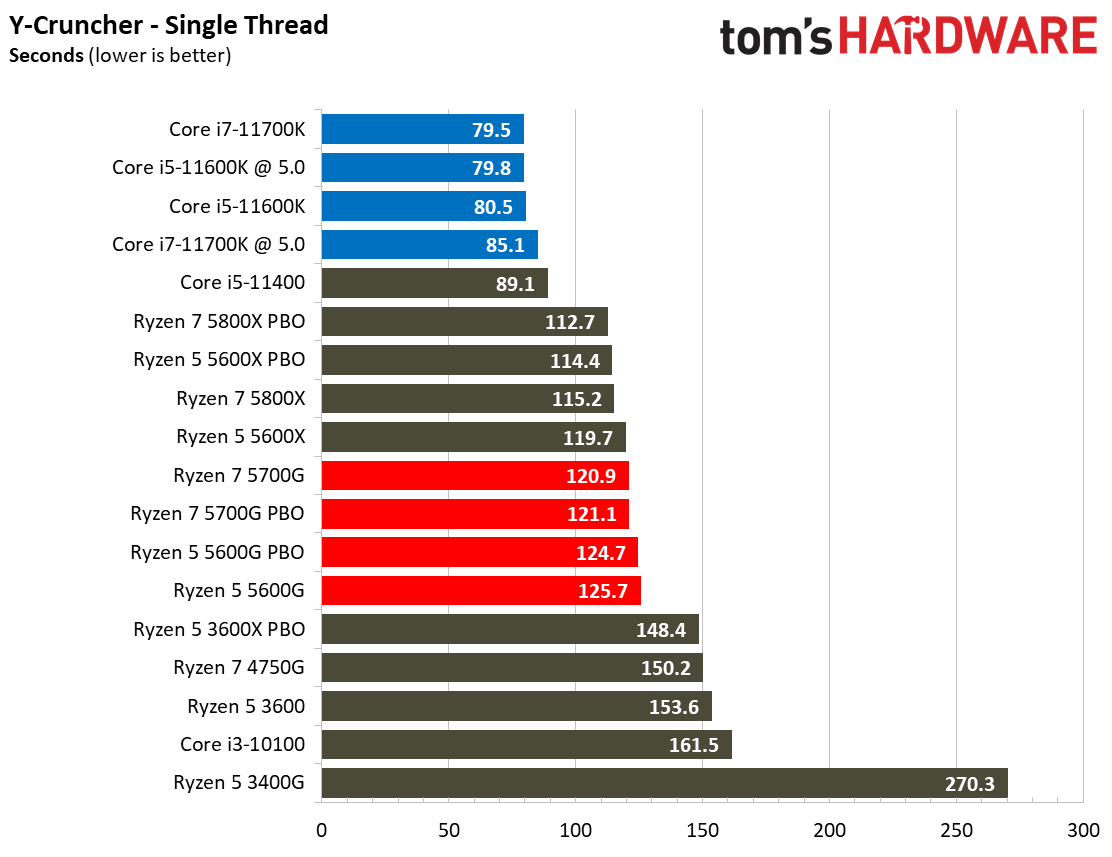
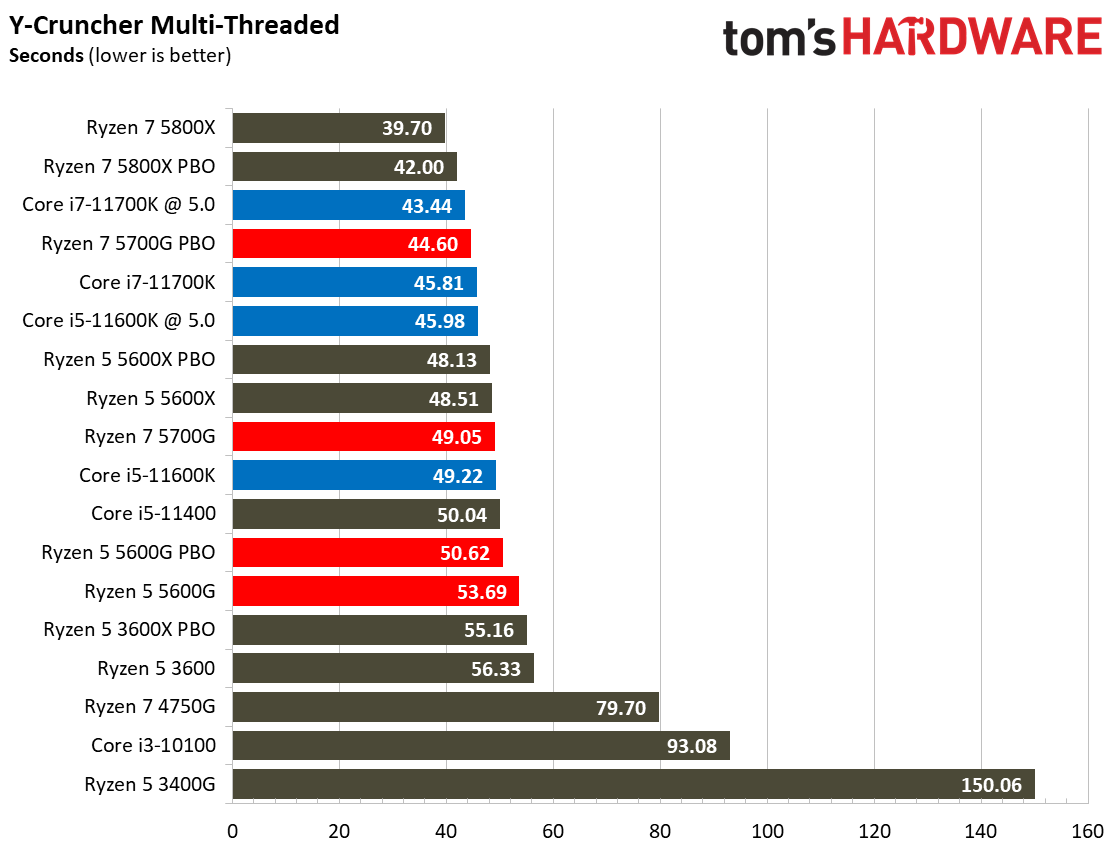
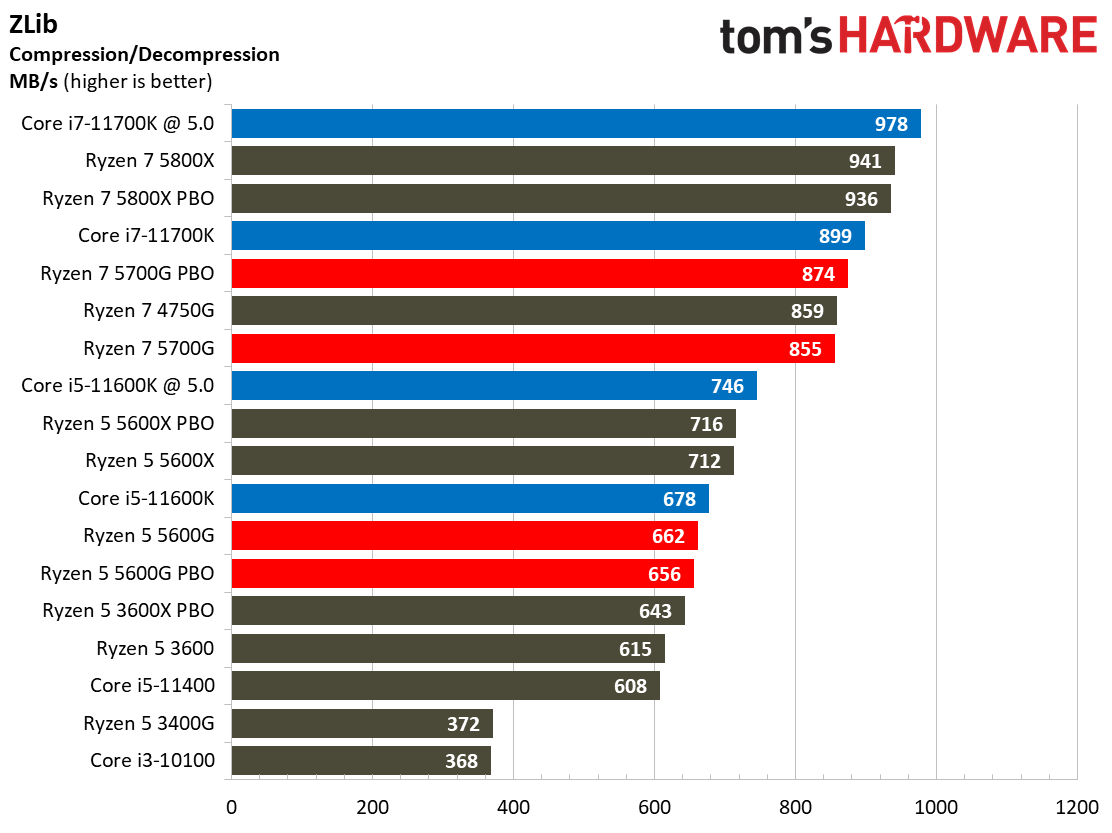
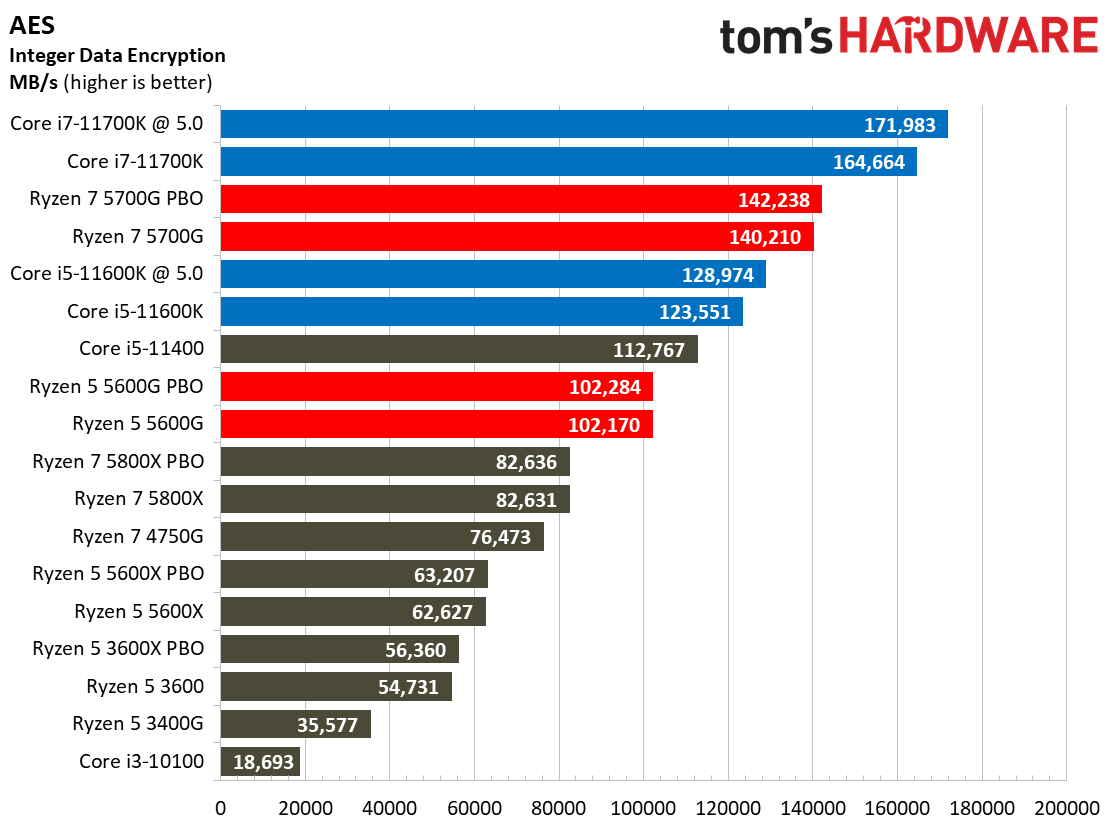
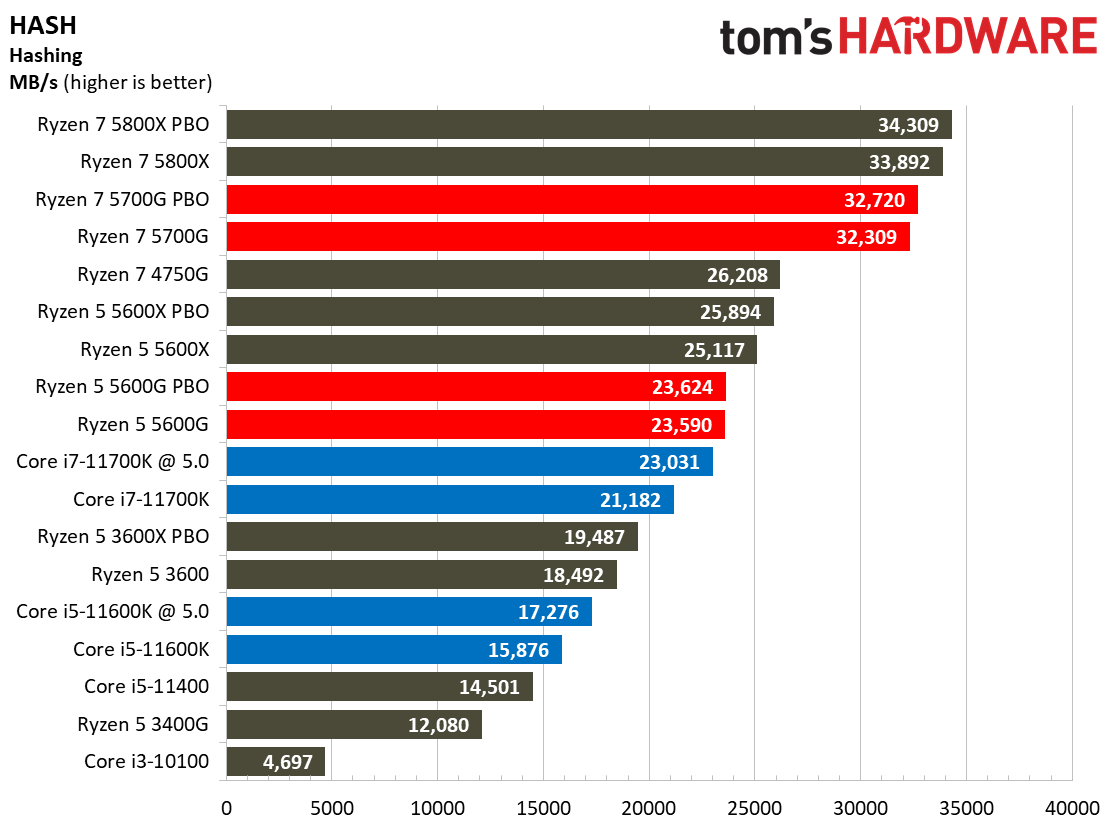
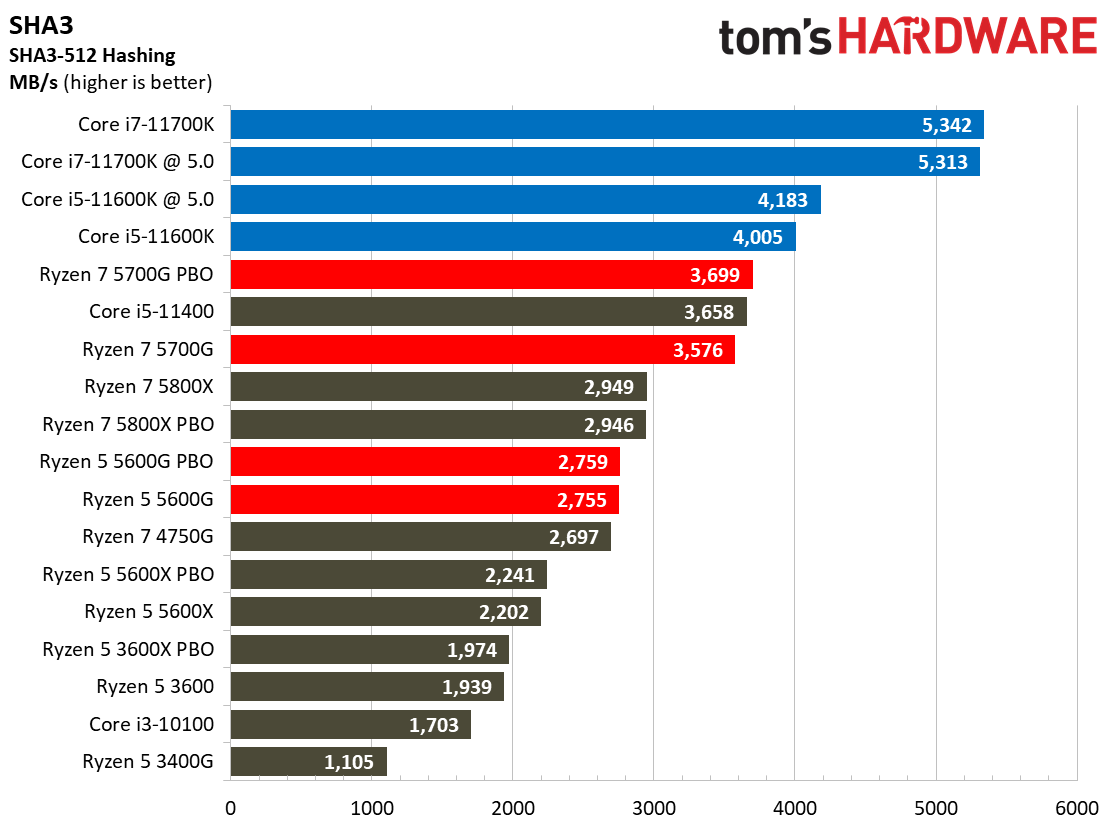
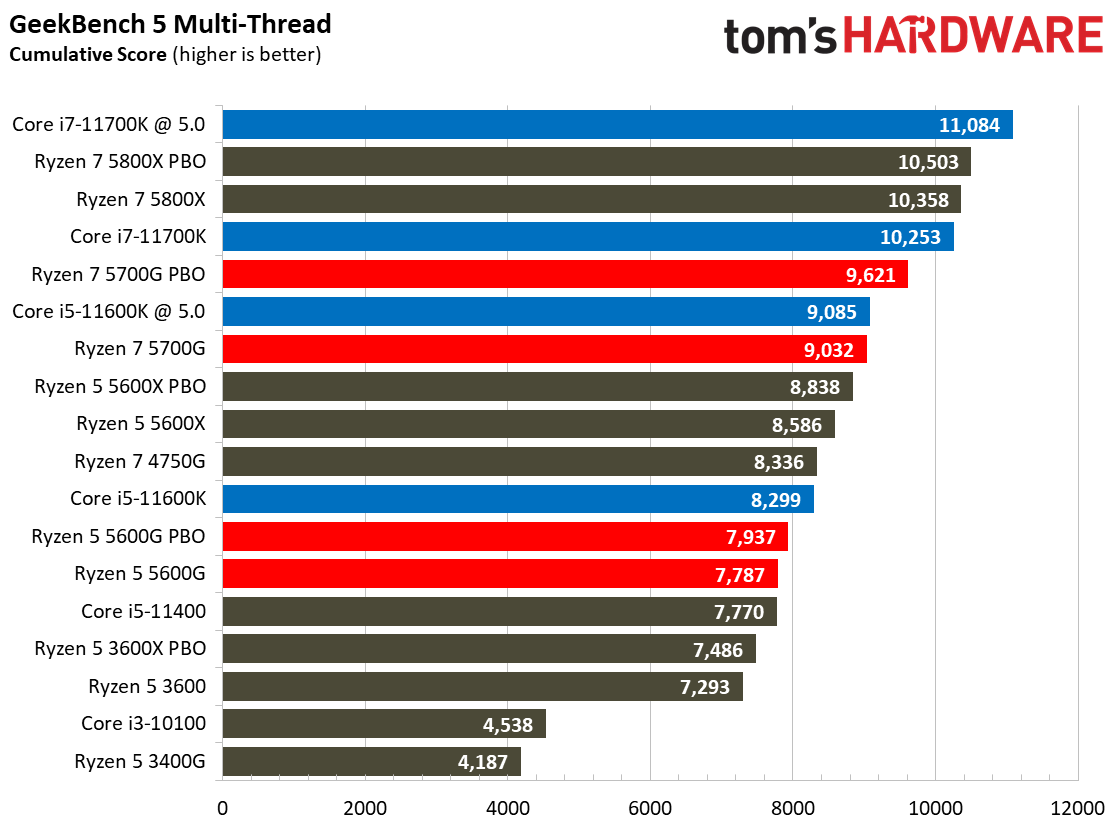
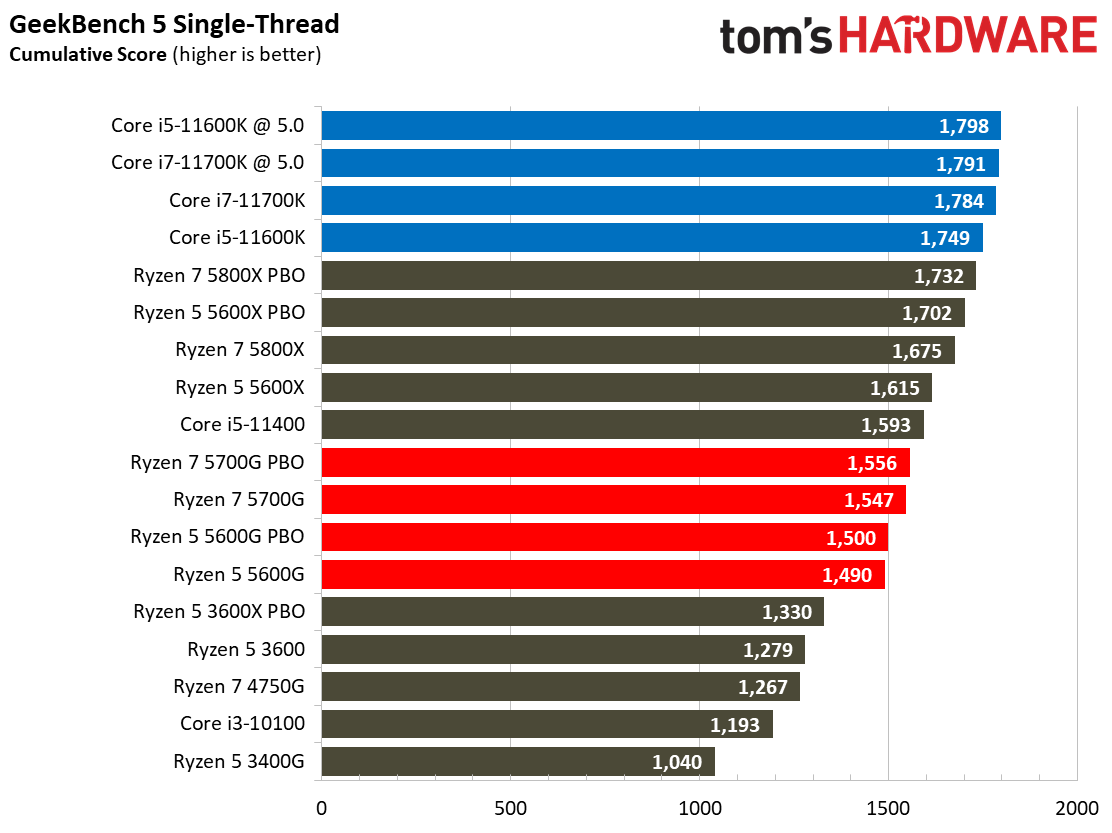
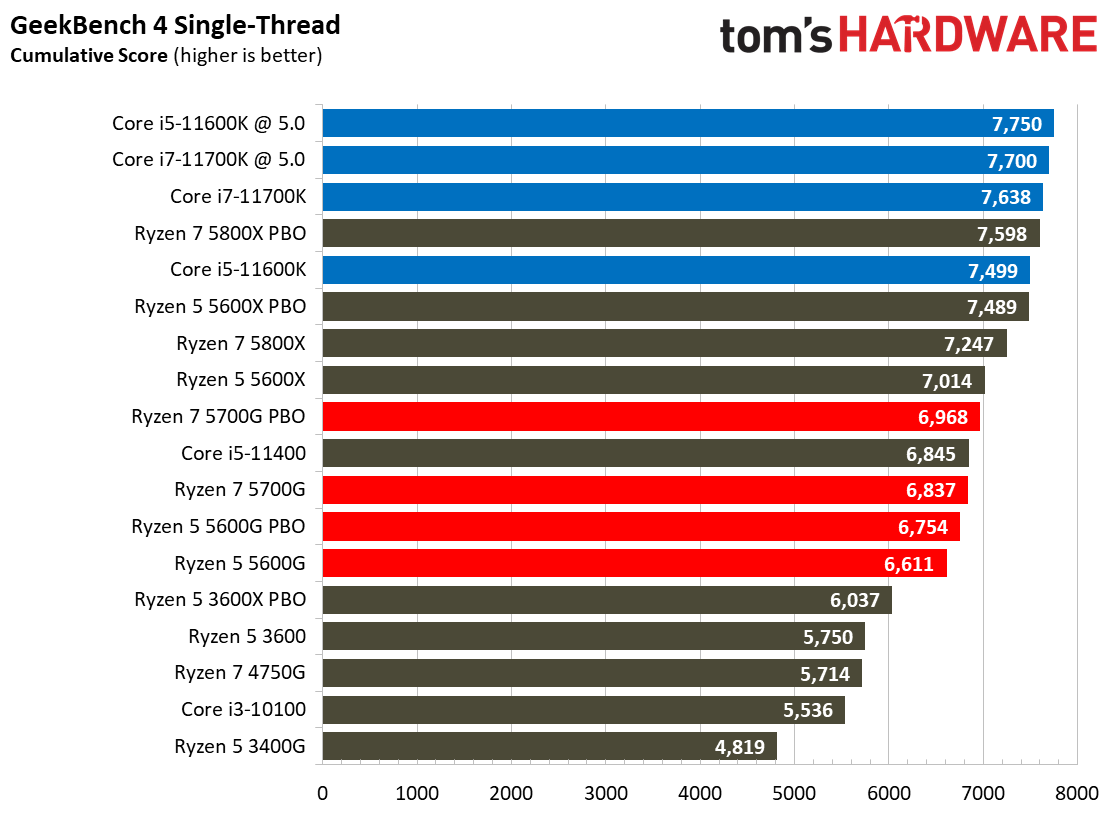
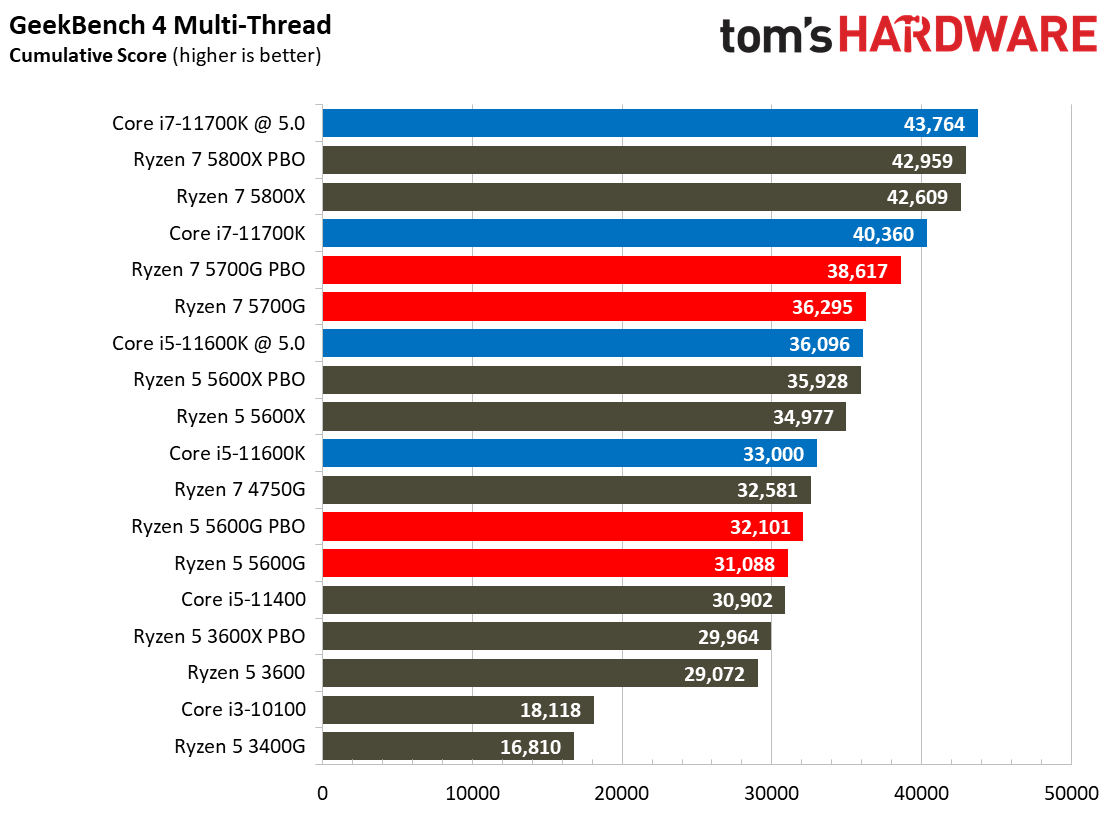
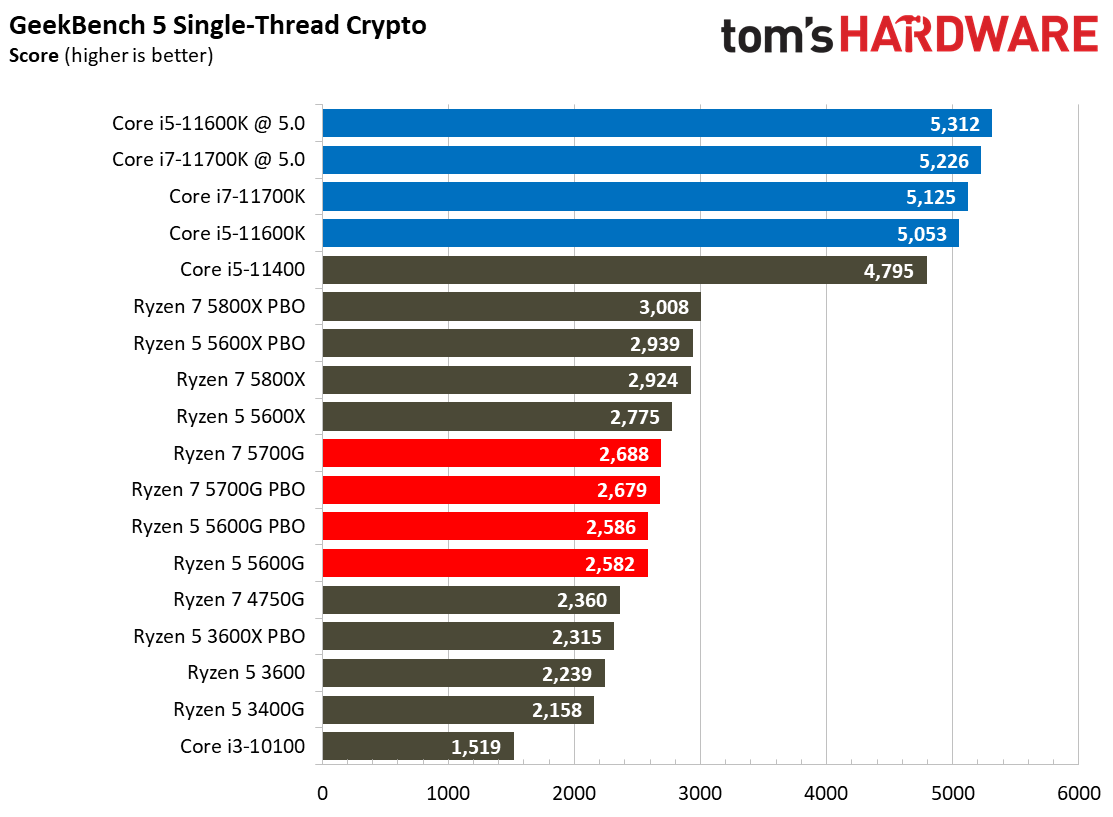
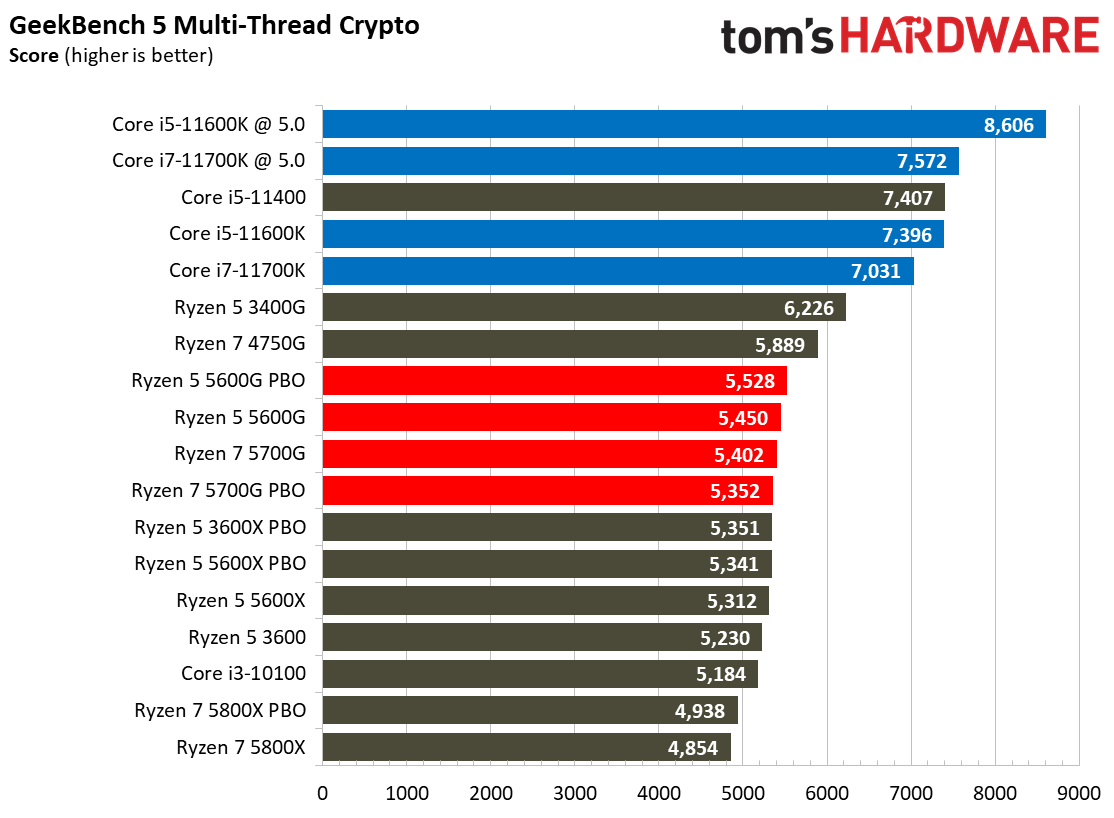
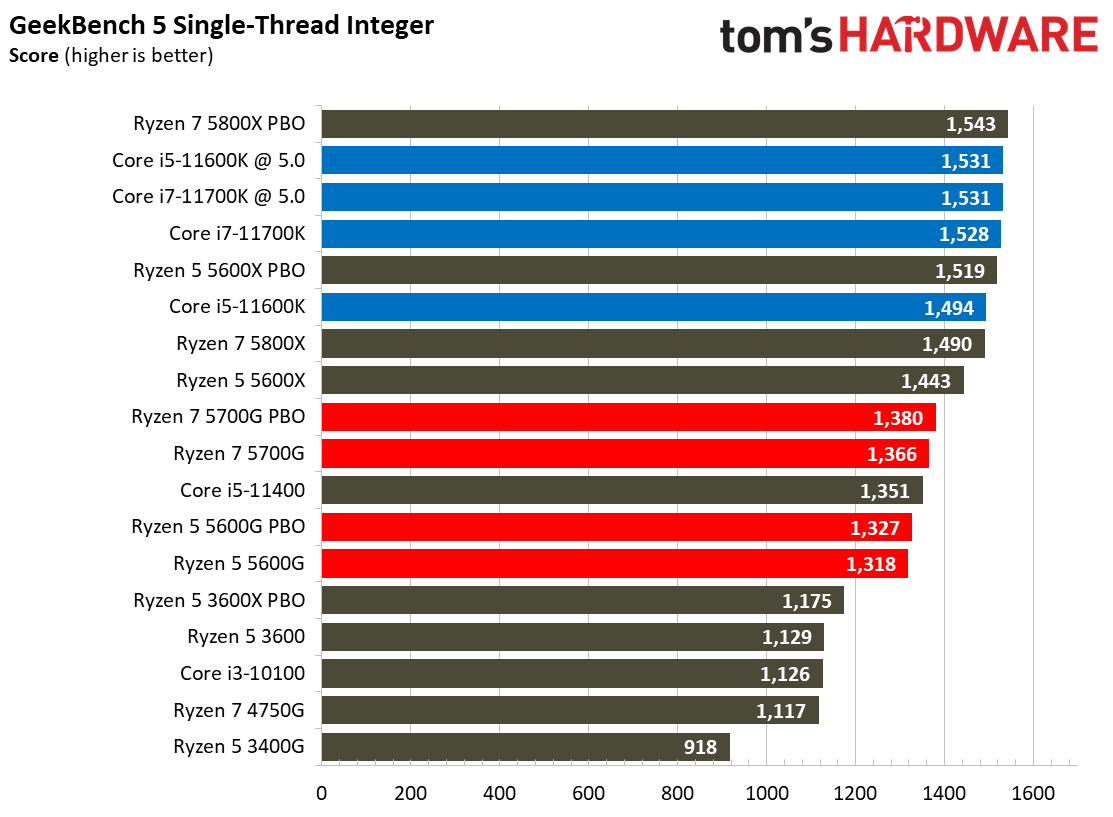
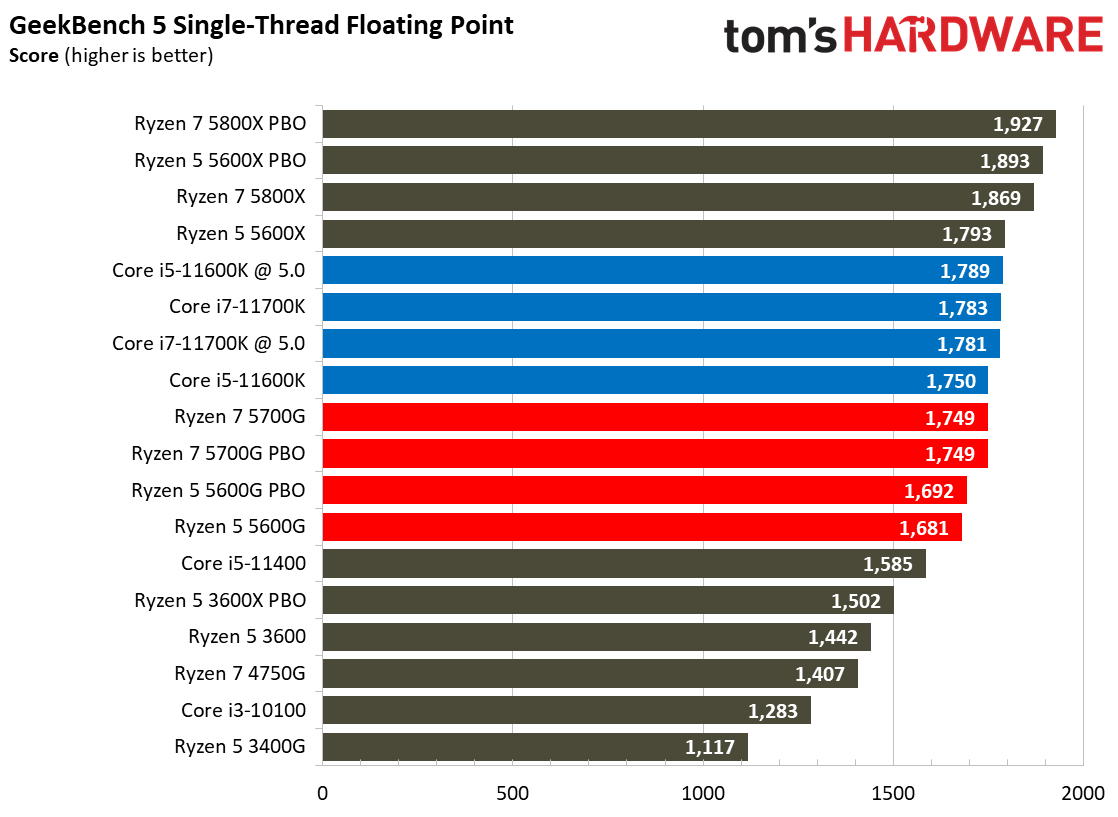
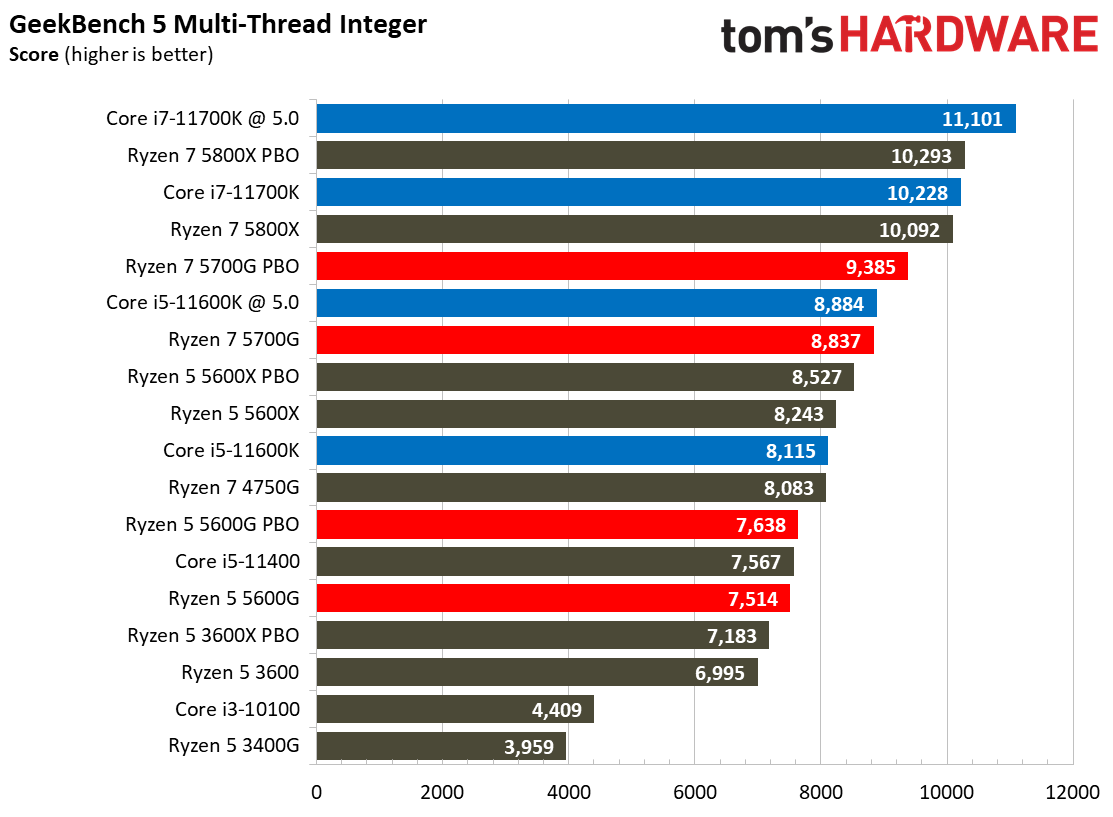
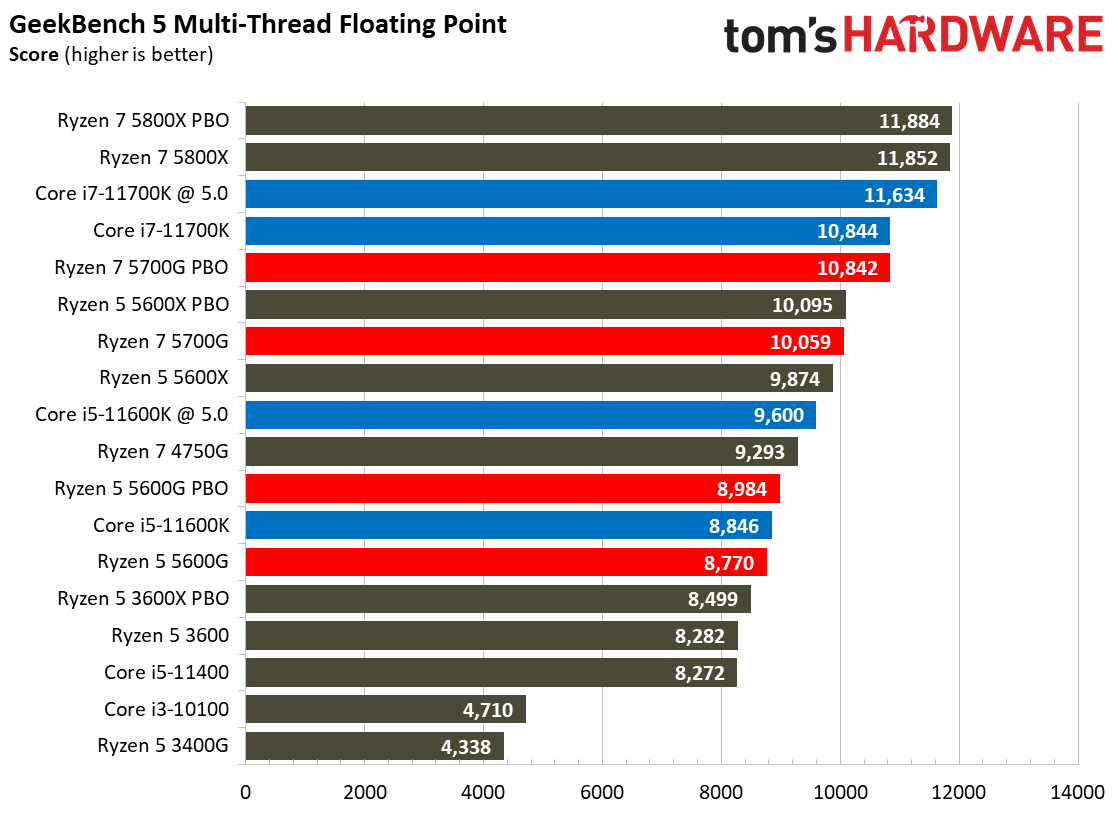
The Ryzen 7 5700G improves both compression and decompression performance drastically over the prior-gen APU models, with the latter even beating out the overclocked intel Rocket Lake chips.
Frankly, most of these tests aren't terribly relevant to the target audience for this class of chip, they're more important for higher-end chips, and we include them for completeness. Nevertheless, the timed LLVM compilation workload, y-cruncher, and NAMD tests do a wonderful job of illustrating the architectural advances AMD has made as it progressed through the Zen+ 3400G and Zen 2 4750G to the Zen 3 APU era with the Ryzen 7 5700G.
MORE: Best CPUs for Gaming
MORE: CPU Benchmarks Hierarchy
MORE: All CPUs Content
Current page: AMD Ryzen 7 5700G Application Benchmarks
Prev Page AMD Ryzen 5 5700G Discrete GPU Gaming Performance Next Page Conclusion
Paul Alcorn is the Editor-in-Chief for Tom's Hardware US. He also writes news and reviews on CPUs, storage, and enterprise hardware.
-
lazyabum Great. Integrated GPUs are being pushed for high-end graphics over the lack of Discrete GPUsReply -
hotaru251 amd had the chance to crush intel's low end if they just had more modern apu inside...let vega die already. its 2021.Reply -
AlexWolfheart Clearly the guy that wrote this piece and declared it "the fastest integrated graphics ever" has rather limited knowledge.Reply
Amd (and Intel, working together) has an old integrated Vega that's close in performance to a gtx1060, basically obliterating the 5700G:
Intel 8809G with the Radeon M GH igpu (found inside intel hades canyon nuc)
It may not be a user replaceable apu, but it IS an igpu that can easily demolish this one in terms of performance. But then again, the clickbait title wouldn't be as good as this, now, would it? :) -
Jim90 Reply
But they ARE crushing the igpu competition...and they're showing they don't need higher than this for that.hotaru251 said:amd had the chance to crush intel's low end if they just had more modern apu inside...let vega die already. its 2021.
Once the competition catches up then, and only then, will they integrate their other choices. From a business point of view this is eminently reasonable, as much as we'd all like integrated rdna2/3 now. -
AlexWolfheart ReplyJim90 said:But they ARE crushing the igpu competition...and they're showing they don't need higher than this for that.
Once the competition catches up then, and only then, will they integrate their other choices. From a business point of view this is eminently reasonable, as much as we'd all like integrated rdna2/3 now.
So, in short, they're greedy, not offering their best because of weaker competition.
If you were hoping to defend AMD, this argument did worse ... -
King_V Reply
Where did you get the performance numbers that back this? I haven't been able to find any solid reviews on this.AlexWolfheart said:Clearly the guy that wrote this piece and declared it "the fastest integrated graphics ever" has rather limited knowledge.
Amd (and Intel, working together) has an old integrated Vega that's close in performance to a gtx1060
(not looking for YouTube videos, but article reviews with charts and such) -
fball922 Reply
Companies exist to make money, and to make as much money (legally) while expending the smallest amount of money possible, so I guess that is greedy? Doing what they are supposed to do? This is literally what every market does. If you were trying to shame AMD for not putting in an iGPU in that makes you feel warm fuzzies, this argument did worse... Of course, if they had gone the route of upgrading the iGPU, then raised the price of the APU, we would probably hear moaning and groaning about how they shouldn't raise the price because it's so greedy of them.AlexWolfheart said:So, in short, they're greedy, not offering their best because of weaker competition.
If you were hoping to defend AMD, this argument did worse ... -
AlexWolfheart ReplyKing_V said:Where did you get the performance numbers that back this? I haven't been able to find any solid reviews on this.
(not looking for YouTube videos, but article reviews with charts and such)
Have you tried... Google?
I've got the performance numbers both from google, but also from actually owning a NUC8i7HVK as my bedroom media pc, but here, i'll post links for you, since it's so hard to find info:
https://www.tomshardware.com/reviews/intel-hades-canyon-nuc-vr,5536.html
https://www.gamersnexus.net/hwreviews/3282-hades-canyon-review-intel-amd-pressure-nvidia-nuc8i7hvk
https://www.notebookcheck.net/Intel-Hades-Canyon-NUC8i7HVK-i7-8809G-Radeon-RX-Vega-M-GH-Mini-PC-Review.290800.0.html
https://www.anandtech.com/show/12572/the-intel-hades-canyon-nuc8i7hvk-review-kaby-lakeg-benchmarked
As I said before: yes, it is not a user replaceable APU, but it is an integrated gpu from over 2 years ago that still mops the floor with all other igpus. -
AlexWolfheart Reply
Given amd's very low market share in terms of gpus, but decently growing cpu market share, going all in and releasing a cpu with a very powerful igpu would be a good marketing decision, to make them sell even more, and make less people buy Nvidia.fball922 said:Companies exist to make money, and to make as much money (legally) while expending the smallest amount of money possible, so I guess that is greedy? Doing what they are supposed to do? This is literally what every market does. If you were trying to shame AMD for not putting in an iGPU in that makes you feel warm fuzzies, this argument did worse... Of course, if they had gone the route of upgrading the iGPU, then raised the price of the APU, we would probably hear moaning and groaning about how they shouldn't raise the price because it's so greedy of them.
Amd could, in theory, with rdna2 integrated, like the xbox series something and ps5, it could make customers not need to buy an rtx3060 (ti or simple), and thus, keep more marketshare for themselves ;) -
greenreaper With RDNA2 coming in 2022, and prices still abnormally high, it's hard to recommend this as an APU unless you need it now or don't care about the new architecture's boosts in power/perf - or having some level of hardware raytracing support.Reply
To me, having feature parity with the latest consoles is important, because that'll help as many games work on it as possible, even if they don't work as fast. The big question for me is whether RDNA2 will work as well without the large cache in its discrete editions.
